This week The Rialto Report lost a friend, the French music producer and songwriter Henri Belolo who passed away at his home in Paris
We became friends with Henri several years ago when we were researching the life of Dennis Parker, who had found fame as a disco singer and soap opera actor, as well as having an adult film career using the name Wade Nichols.
Henri was born and raised in Casablanca, Morocco, before traveling to Paris, France, in 1956 when he was 20. He worked for Polydor Records in Paris, and organized concerts in Paris in the 1960s by James Brown, the Bee Gees and others.
In 1973, he moved to the US and set up Can’t Stop Productions in New York City. He met Jacques Morali in early 1975, and the pair produced the single “Brazil” by the Ritchie Family. Unlike Morali, Belolo was not gay, but he visited clubs with Morali and saw the potential of appealing to the gay nightclub scene. In 1978, they set up the group Village People, seeing their image of gay stereotypes as a way to embody a certain partying spirit. Belolo and Morali began working with a number of other disco acts – including Morali’s lover, Dennis Parker, who had a hit single with the single, ‘Like An Eagle’.
Dennis’ story was more interesting than just being a disco star: He was a gay man – but appeared in largely straight porn films. He had a high profile in 1970s disco – even though he disliked disco music. And he finally found success as a daytime soap opera star – just as he became terminally ill.
Henri spent hours with us talking about his life – and his memories of Dennis. He was king, generous, and great company. We stayed in touch with him afterwards, and he remained a friend.
Over 30 years after his passing, Dennis Parker remains an enigmatic figure: featuring new interviews with his family, acquaintances from the New York club and gay bar scene, adult film actors and directors, music and television industry friends, and many more, this is the story of Dennis Parker’s life.
With thanks also to Lansure for sharing wonderful photos of Wade Nichols.
_______________________________________________________________________________________________
Prologue – New York, 1977:
The stifling heat of a New York restaurant kitchen in summer.
A restless and curious woman wanders away from the dining area. She’s looking for trouble. The elegant patrons eating to the soundtrack of a Strauss waltz hold no interest for her.
She descends a staircase into the sweaty bowels of the building. She happens upon the kitchen. She wanders among the anonymous cooking staff, but is invisible to all of them.
And then she sees Him.
Standing behind a worktable is a shirtless, mustached piece of beefcake. He is rugged yet pretty. He’s Marlboro man from the plains, moonlighting as a Manhattan sous-chef. He’s lean, toned, and handsome. He has the appearance of a man in love, most likely with himself.
His look is unequivocal: ‘Come to where the flavor is’.
The female circles her victim snarling like a hyena. The male spots her, and returns her glance with an incredulous gaze.
The only noise is the sound of cooking pots banging against each other. These two are at the center of the universe, oblivious to the irrelevant world that circles them.
She spies a large metal mixing bowl on the floor. An idea flashes across her mind. She laughs, and kicks the bowl, positioning it beneath her parted legs. She looks back at him, giggling manically.
He smiles, his eyes narrowing quizzically like the hero of a low-rent spaghetti western.
She starts to crouch over the bowl.
The realization dawns on him. She’s not going to, is she? Surely not?
She lowers herself towards the bowl.
‘Cut’, whispers the film’s director, Radley Metzger. He stands up straight, and wipes his brow. He feels dizzy. He’s seen it all in a 20 year career in film. But, as he admits decades later, this scene feels different. And he hasn’t even started shooting the sex yet.
He calls over the two actors, Wade Nichols and C.J. Laing. In a hoarse voice, he tells them about what comes next.
*
1. Freeport, NY (1950s):
Wade Nichols was born Dennis Posa on October 28, 1946 and grew up in the town of Freeport, NY, thirty miles east of Manhattan on the south shore of Long Island. In the summer, the town was a popular vacation spot, but during the off-season, it became an anonymous and forgotten place.
Richard Posa (Dennis’ brother):
We spent all our childhood in Freeport. I was born in 1943, so I was three years older than Dennis.
We grew up in an apartment building, where there were a couple of families with kids our age.
Our father was a florist who worked for a number of different businesses. His family was of Italian heritage and hailed from Casamassima, a town in southern Italy. Our mother worked in the children’s section of the local library.
They both liked jazz – in fact, that’s how they met. My father had a friend, named Johnny Guarnieri, who played piano in the Bronx, and my father and his friends would tag along to go and listen to the shows. My mother was dating Johnny’s bass player, Leo, so that’s how they found each other.
My father was maybe around 26 when they met. My mother was 20.
Dennis’ childhood was not an entirely happy one. Both his parents had their demons, which had a destabilizing effect on the boys.
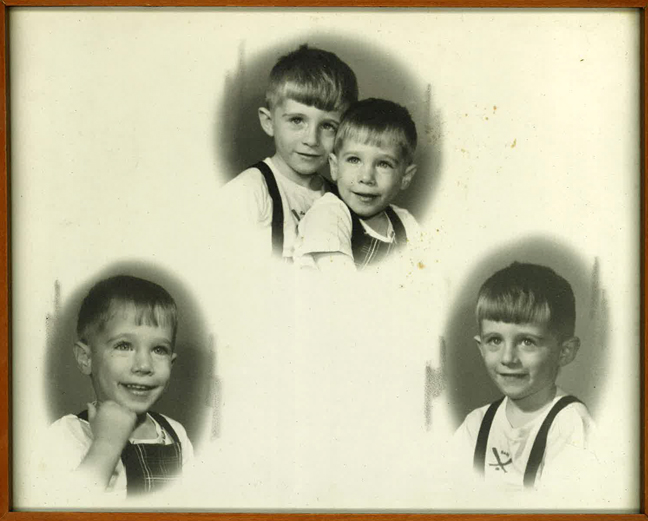 Dennis (bottom left) and his brother Richard (bottom right)
Dennis (bottom left) and his brother Richard (bottom right)
Richard Posa (Dennis’ brother):
The first few years were good. When Dennis and I were young, our father was caring. He was a very good-looking man, and Dennis looked somewhat like him. I always thought this made my father favor Dennis a bit more.
As we grew up though, my father lost interest in the family, and began to disappear for weeks at a time. When he returned, he and my mother would fight all the time and he’d be verbally abusive to us too.
A big part of the problem was my father’s gambling. He was a gambling addict, regularly blowing the money that was meant for our food. Friday was the weekly food shop day, but often he’d just take the money and not come home. When this happened, it was typically because he’d fallen behind with bookies, and he used the money to settle his debts.
When he disappeared, he was usually hiding out with one of his five sisters. On one occasion, the family found out that the bookies were threatening to break his legs if he didn’t pay up… so they helped him out and covered the debt for him. Needless to say, he didn’t pay the family back, so the family joke was that the next time, they were going to break his legs…
Dennis had a lot more nerve than I did, and once he went through our father’s stuff and found $8,000 worth of racing stubs. Bear in mind, in those days our father was making $5,000 a year, so this was a huge amount. Dennis and I talked about confronting him but we decided against it.
My father’s problems tended to overshadow my mother. She developed severe issues of her own, and became agoraphobic and was afraid of leaving our apartment. Fortunately, the library where she worked was only a few blocks away. She was happy there. She loved books, and read a lot of English literature.
It wasn’t the happiest of childhoods, and at times, home life became terrible.
Neither Dennis nor Richard were close to their parents as kids, and when they were young, they weren’t particularly close to each other.
Richard Posa (Dennis’ brother):
As kids, Dennis and I were quite different. We became closer later in life, but growing up we lived separate lives. I was into reading and mathematics whereas Dennis was more of an artist and loved to draw and paint pictures. He also loved to make things and developed an interest in carpentry.
We did have some things in common. We loved animals, as did our parents, so we always had a dog and cats. Also, we both belonged to the rifle team in High School; we had no interest in hunting – we loved animals too much for that – but we joined because we thought that target shooting would be fun. Dennis continued this interest long after his school days had finished.
Physically there was no getting away from each other. Our apartment was small, and Dennis and I shared a room in which we had bunk beds – Dennis was always on top.
He was quiet for most of his early life, but I noticed a sudden change when he was 13 or 14. For some reason it coincided with him having his tonsils taken out. After that, he came out of his shell, and was more energetic and outgoing.
High school pictures of Dennis show a geeky teenager, almost unrecognizable from the future disco and adult film idol.
From an interview in Mr. magazine, May 1978:
“I wasn’t very attractive as a young kid. I was a loner and it was tough.”
Richard Posa (Dennis’ brother):
I didn’t get a sense of Dennis’ sexuality when we were growing up. I remember he used to look at the pictures of women in Playboy magazines – but that seemed normal… all of the boys did that.
He didn’t date in High School but I didn’t think much about it. It just wasn’t something that we talked about.
*
2. Philadelphia (Late 1960s)
When Dennis was 18, he was keen to leave home. He also wanted to continue studying the arts that he had enjoyed in school.
Richard Posa (Dennis’ brother):
Dennis graduated from High School in 1964, and went to study pottery and design in Philadelphia at the College of Art. I didn’t know too much about what he did there, but I remember he dated a couple of girls. He brought one of them home to meet the family.
While a student in Philadelphia, Dennis became interested in acting.
From an interview in Rustler, Volume 1 Number 5:
“In 1965, I was in art school, and was into art only so far as painting and sculpting… making things with my hands… like furniture.
(Then) a friend who had worked on the Beatles’ films pulled me out of study and told me I could act, and that he wanted me for some project he was working on. The film was very avant-garde. It was called ‘For One Only’ and it never got released.
(After that) I got a role in a traveling production of ‘The Trojan Women’. That was 1966 in Philadelphia.”
Richard Posa (Dennis’ brother):
In the end he dropped out of college in 1966 after two years. I was never sure why he didn’t finish, but I always wondered if it was because of money.
Over the next couple of years, Dennis appeared in a number of low budget theatrical productions, while sustaining himself by picking up carpentry and construction work, and modeling nude for still-life classes at the college.
In later interviews, Dennis often claimed that he also appeared in a few ‘nudie-cutie loops’ while in Philadelphia, though none have ever come to light.
From an interview in Mr. magazine, May 1978:
“Some guy named Edwards got me into them – for money – good money in those days. I got $60. It was fine. Art students are notoriously poor. They were the old morality stag films… black socks, boxer shorts… but that was not really porno then.”
From an interview Skin magazine, Vol 1, Number 5:
“A lot of time we just stood and bounced around. There was very little story, no sound, and they were sold under the counter.”
In one of his trips home to Freeport, he came out to his mother and father as gay.
Richard Posa (Dennis’ brother):
In 1968, Dennis told our parents about his sexuality. He didn’t tell me at the time – I learned about it from a cousin. I don’t know much about these things, but my impression was that Dennis was bi-sexual.
My parents didn’t take it that well. My mother was squeamish about sex anyway, so she didn’t talk about it with anyone. As for my father, he told people he was heartbroken.
It must have been difficult for Dennis. It was difficult for all of them.
Not long after this, Dennis’ father passed away.
Richard Posa (Dennis’ brother):
My father remained a compulsive gambler to the end. When I was 21, he suggested that I buy a car. I hadn’t had it long when he stole and sold it. I confronted him, and he said he junked it because he found that it was defective, so he had to get rid of it. That was the way he was.
He was a heavy smoker, and by the time he was in his 40s, he had emphysema and was in bad shape. I found out later that Dennis visited him when he got sick. Dennis went up there once a week to see him.
Our father died of lung cancer on October 10, 1970. He was only in his mid-50s.
*
3. Move to New York
In 1968, Dennis moved to New York.
Richard Posa (Dennis’ brother):
He got this rent-controlled apartment at 25 East 38th St, which was to be his home for the rest of his life.
He was proud of it. It was an old place; he put in new flooring, and when he took up the old floorboards, he found newspapers beneath them that dated back to World War One.
Dennis was keen to continue acting, and started auditioning for theater parts.
From an interview in a later press release:
“Acting was more satisfying that anything I’d done up to that point. And I decided to see what I could do in that milieu.”
Ad in the Village Voice (1968) for an off-off Broadway play called ‘The Sound of a Different Drummer’:
“Do you Dig Being Naked in the World? Love Boys Love Girls? Participate in the Ultimate EMBRACE! Get Bread for Doing Your Thing in Our HIT SHOW”.
This Village Voice ad for ‘The Sound of a Different Drummer’ was looking for actors to take part in ‘a counter-culture experience’. Dennis auditioned and got a part in it. He claimed later he had no idea what it was all about, but it was a regular, though low-paying acting gig. It lasted for several months, but came to an end when he collapsed onstage one night, and was rushed to hospital with appendicitis.
Jon Bletz (Dennis’ friend):
It took him some time to recover physically from that incident, and when he returned, his part in the play had been given to someone else. He was upset and discouraged by that, and he decided to jack in the whole acting thing. He was pissed by how much you had to struggle for acting jobs… with little guarantee you were going to get anywhere.
Richard Posa (Dennis’ brother):
He supported himself by getting work as a commercial artist. Then he started work for Jiffy Simplicity, a company that made dress-making patterns for the American housewife.
Meanwhile back in Freeport, Dennis brother and mother decided to leave the area.
Richard Posa (Dennis’ brother):
After my father died, I moved down to Virginia, and my mother moved down with me too. Dennis visited and helped me make bookcases and build some things for my new house. He was good at that.
He’d come down to see us a few times a year, and I’d go up to New York too. His apartment was small, so we always slept in the same bed!
We started to become closer as brothers. We talked more, and became more like friends. I talked to him once a week on the phone.
In early 1969, Dennis met Skip St James. Dennis was 26 at the time, Skip was in his early 20s.
Skip St. James (Dennis’ partner in the early 1970s):
Dennis chased me around for about a year or so, but I was always with somebody else. I’d see him in bars, and he’d just stand there and stare. He was absolutely beautiful. And then one day, we finally hooked up. We became a couple and were together for four years, from 1969 through 1973.
I moved in with him and we lived together in his apartment at 25 East 38th St. He lived in a fifth floor walk-up, a tiny one bedroom rent-controlled place, which he paid $75 a month for. His apartment was basically a big studio. It had a small room where he slept on a pull-out sofa. It had a tiny kitchen. Really tiny. Then there was a bedroom with a skylight. He used that bedroom as his art studio.
Skip St. James (Dennis’ partner in the early 1970s):
He was really into his art. He did drawings, charcoals, and painting. He was a master carpenter too. All around the fireplace, he had built-ins from one wall to another. They were beautiful.
We weren’t the only people who enjoyed the space… I remember that every Wednesday afternoon, he’d give his apartment to this woman who was married – and she’d have sex with her boyfriend there. Obviously, we’d have to get out for a couple of hours. I think she was someone he worked with at Simplicity.
For the first time, Dennis was in a steady relationship and living with his partner. But this didn’t stop him from enjoying the New York night life.
Jon Bletz (Dennis’ friend):
After he gave up trying to be an actor, I thought he became a little jaded and cynical. He responded by hitting the bar scene big time. It was like “nothing is gonna get in my way now.”
Skip St. James (Dennis’ partner in the early 1970s):
He was very sexual. All the time. Sex was number one for him, always on his mind.
Our relationship was not exclusive. Dennis insisted it wasn’t exclusive. We had space for other relationships – either individually or together. He was very into three-ways, orgies, and cruising, and he loved leather bars. I remember wearing tackaberry buckles. He insisted on wearing them, and he bought me one. He showed me how you’d hang your keys from left to right. I was new to all this. He was a showman more than anything else.
His favorite bar was The Eagle’s Nest on 22nd St where the West Side Highway is. We went there all the time on his motorcycle.
The Eagle on the West Side Highway at 142 11th Ave and 21st St. It was a legendary drinking spot that catered to Manhattan’s leather-clad S&M crowd.
Mark Martinez (Dennis’ friend):
The Eagle was the best leather bar. It was isolated in a quiet, dark area by the water, and it reeked of menace and thrill. The place itself was hot and sweaty and exciting.
Dennis was there all the time, and I hung with him. He was a beautiful man, and sexually voracious. It was difficult not to love him.
Errol Jones (Dennis friend):
For years, I ran into Dennis all over town. He seemed to be at every gay club. You couldn’t miss him. For a start, he was good looking. And secondly, he was… well… willing and enthusiastic. I remember seeing him come out from the restrooms in one place… that were renowned for glory holes. So I approached him. He was friendly. I suggested we go back to my place, but he gestured for me to join him in the back of this club. It was an area I rarely went, because it was so dark. But he led me back there, and… well, it’s a happy memory.
Mark Martinez (Dennis’ friend):
Needless to say, he didn’t use condoms. Why would you? None of us did. We expected to live forever.
Skip St. James (Dennis’ partner in the early 1970s):
Another place we went was called The Barn. They had back rooms. We’d always be looking for a three way.
As far as sex would go, he was not a top. He was a bottom. In fact, his big thing was getting fist-fucked, and being on the receiving end. He liked to watch too.
Dennis was never safe with sex at all. Once we went to Puerto Rico, and we went to the old part of town where there were all these shacks. I forget what the place is called. It’s supposed to be dangerous. We walked down there. I remember him screwing this Puerto Rican kid in broad daylight.
Even though we weren’t exclusive, I felt close to him. He was the love of my life. At the time.
By day, Dennis’ life was more straight and unassuming.
Skip St. James (Dennis’ partner in the early 1970s):
All the time I knew him he worked at Simplicity Pattern Company on Madison Avenue. It was just around the corner from his house. He was an artist there, and he drew their patterns for them. That’s all I ever knew him to do. He worked there for years.
In his spare time, Dennis hadn’t completely given up on the idea of performing.
Skip St. James (Dennis’ partner in the early 1970s):
He told me he wanted to be a singer. And he had a beautiful voice. He also acted occasionally, and he did a play on 14th St. off 5th Ave. I can’t remember what it was called, but it was a really dark play.
I’ve read rumors online that when he came to New York, he went to NYU and also studied acting at the Herbert Berghof Studio. I don’t believe that’s true at all. I would have known that.
Dennis had modeled at college in Philadelphia, and still picked up the occasional modeling job.
Skip St. James (Dennis’ partner in the early 1970s):
He appeared in this New York magazine called ‘Michael’s Thing’. It was a small guide to gay entertainment in town… you know, bath houses, porn theaters, and lots of sex… that sort of thing. It would feature pictures of Dennis on a motorcycle on a bridge over the pool at the Cherry Grove Ice Palace.
His looks meant everything to him. He was insecure, and he could be self-absorbed. I don’t mean that he was shallow. He wasn’t by any means, but he took great care of his appearance, and he could be a little vain.
He had a good body. He was just naturally trim, not muscular by any means. He was Italian so he was hairy. I never even knew until late in our relationship that he use to meticulously trim all his chest hair down. Not off, but down.
Richard Posa (Dennis’ brother):
Dennis got into motorcycles sometime after he left home, and he would go everywhere on them… no distance was too short or too long. He and Skip drove from New York to Virginia on the motorbike to visit us for Thanksgiving in 1973.
Skip was a nice guy, friendly and pleasant. They didn’t make a big deal about being a couple so that part was unclear, but when they came down they slept in the living room.
Skip St. James (Dennis’ partner in the early 1970s):
He loved his motorcycle and we liked to ride on the weekends and go to museums. We’d go to shows at night. You couldn’t keep him off it.
Richard Posa (Dennis’ brother):
When I visited Dennis in New York, we wouldn’t do anything crazy. He was still doing his carpentry and he developed an interest in cooking.
We’d ride around the city and go to the Village. He loved jazz and he had a large collection of old 78s. His preference was 1920s jazz. We went to a few concerts. I remember seeing Stéphane Grappelli with him.
Skip St. James (Dennis’ partner in the early 1970s):
Dennis loved guns too, and he was an avid gun collector. A place on 11th St and West 4th St. had antique guns in the window. We used to stop by there and go in. He loved that place.
From Rustler, Volume 1 Number 5:
Rustler: What types of guns do you collect?
“Black powder mostly. Flint locks and antiques.”
Rustler: Are you a legal collector?
“Oh yes… registered… the whole bureaucratic bit.”
Skip St. James (Dennis’ partner in the early 1970s):
Most of his friends were people from the bars. Dennis was simple like that.
He cared about other people greatly. He was very jovial and wasn’t mean spirited in the slightest. He was a good guy, and we had happy times. We spent a lot of time together.
Richard Posa (Dennis’ brother):
Dennis lived with Skip for four years or so, but they eventually split up.
Skip St. James (Dennis’ partner in the early 1970s):
We had a good time, but most things come to an end, right?
After Dennis and I split up, he started dating a guy named Joey, who was the ex-boyfriend of my best friend, Tony Gianetto. Joey and Tony were roommates.
Joey Alan Phipps was an aspiring actor and sometime model for gay photo layouts, and was 11 years younger than Wade.
Skip St. James (Dennis’ partner in the early 1970s):
Joey was a cute kid. Dennis’ preference was blond Twinkies. That’s what he liked. He did date a young black guy once for a short time, but mainly it was blonde Twinkies. I was a blonde Twinkie. Joey was a blonde Twink.
*
4. Adult Films
By 1975, Dennis had left his day job in the office, and started making his living through his carpentry. He also made money by posing for photo sets for gay-oriented companies like Target Studio and others.
Jim French, aka ‘Rip Colt’ (photographer, founder of Target Studio and Colt Studio):
Dennis was one of my favorite models from the time. Always willing, professional, and easy to work with… and he had a great look. It was easy to take great pictures of him. He was this rare phenomenon, in that he appealed to women just as much as he appealed to men. I always thought he was bi-sexual.
A number of friends remember Dennis having another source of income.
Jim French, aka ‘Rip Colt’ (photographer, founder of Target Studio and Colt Studio):
It was an open secret that Dennis ran a personal ad, I think, in the Village Voice. I’m not sure of exactly what the ad was for – but it was for services that were sexual in nature. I think it was in the Village Voice, or maybe the East Village Other.
Carter Stevens (adult film director):
Dennis told me he also was a call-boy before he got into films. He was very open about it.
In 1975, Dennis appeared in his first adult film, David Durston’s ‘Boy ‘Napped’ (1975). He adopted the name Wade Nichols, created from his middle name and his father’s first name.
Jamie Gillis (adult film actor):
I met Dennis, or Wade as he wanted to be called, on the set of ‘Boy ‘Napped’, and he told me it was his first experience on a film set. It was an all-male cast and I remember thinking how natural he looked around the other guys in sexual situations. I mean… that’s not normal. It’s an unnatural environment. I had difficulty when I started out. But he was very relaxed.
I thought, “Here’s a guy who’s not a stranger to having sex in front of an audience…” Later he told me he’d been some kind of an escort.
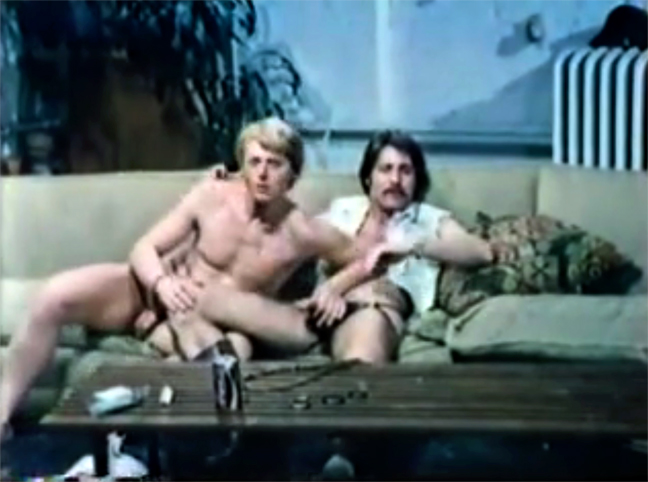 Wade Nichols in ‘Boy ‘Napped’ ‘ (1975)
Wade Nichols in ‘Boy ‘Napped’ ‘ (1975)
David Durston (director of Boy ‘Napped’):
Dennis was a gift to porn films. Here was this great looking guy, and an incredible body that looked like he worked out every day.
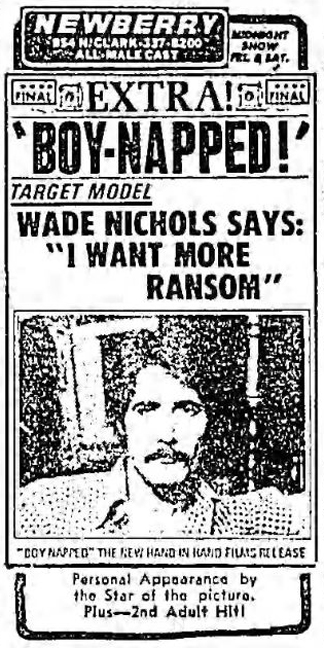 Dennis makes a rare personal appearance to promote a movie
Dennis makes a rare personal appearance to promote a movie
Richard Posa (Dennis’ brother):
Dennis wasn’t a sporty guy. As far as I know he never played any sports. He did some weight lifting at some point but not seriously, and it didn’t last long.
Jamie Gillis (adult film actor):
Dennis could perform sexually, and act well, but I was still surprised to see that he started turning up in mostly straight films after that. I figured that he was a guy who wasn’t interested in having sex with women… but he was just as natural in the straight films too.
Dennis starting making a name for himself in the growing adult film industry, first appearing in small roles such as ‘Guy in Woods’ and ‘Delivery Guy’, but then in more prominent lead parts in bigger budget features.
The newly-launched adult film magazines fawned over the rising star, and were eager to profile him.
From ‘Skin Biz’, Vol 1, Number 5:
Young, energetic, good-looking and bold. He comes to the door wearing a tight workshirt and faded blue jeans with a navy blue handkerchief flapping from his back left pocket.
His Manhattan apartment in a 5-storied brownstone is eclectically hip. The flavor is rustic, offset by a burning wood fireplace, beautifully shuttered windows and cabinets which he made himself. A motorcycle helmet, sitting on the floor, accompanies his Honda 550 garaged down the street. A light barbell set, outside his apartment door, keeps his 6’ 1”, 180-lb physique in shape.
Reefer odors permeate the air, and the telephone rings nonstop until he finally hooks it to his answering machine. His name is Wade Nichols, one of today’s swinging 32-year-old bachelors, but with one exception. While most men only dream about their sexual fantasies, this man indulges in them… on screen.
From Rustler, Volume 1 Number 5:
Wade Nichols is special. The handsomest and most talented of this breed of super-men. Perhaps he is the last of the true matinee idols.
Right now, he is content, building furniture, traveling and making erotic films.
The Clark Gable of Porn was hanging a chandelier when we visited his hand-built (decorated, at least) Manhattan apartment.
From Flick, May 1977:
He loves biking and the outdoors. He loves camping out and making love with nature. He loves fucking on his motorcycle and being spontaneous.
From an interview in Flick magazine, May 1977:
“You know, being a film star is really an ego trip for me. I love it when people come up and ask for my autograph, or stare at me and point. But I don’t like to see myself on film. I’m really a bit shy, not aggressive at all…”
At first, Dennis didn’t intend the film work to be more than an occasional way to make some extra cash. After his early success however, he saw an opportunity to use the film money to establish his own carpentry studio.
From an interview in Rustler, Volume 1 Number 5:
“One day I decided to take a last stab at it. (I’d) make a bunch of films and set myself up in a shop making custom lofts and furniture. Well, things picked up, so well, in fact that I remembered that I could act if I had to.
If you are working with people like Georgina (Spelvin), or Annette (Haven) or Leslie (Bovee)… you work extra hard on the acting. I worked hard and soon had no carpentry tools left. So now, I intend to keep working in the blue film business until the police tell me that I can no longer make these films.”
Skip St. James (Dennis’ partner in the early 1970s):
I only found out that he was making adult films years later. I was surprised. Not surprised that he was doing porn, but that he was making straight porn… he never had relationships with women. He wasn’t bisexual in any way.
Dennis worked in the occasional gay film or loop, but predominantly appeared in straight films. This created a problem for the magazines that had started to cover the industry. They wanted their male stars to be fiercely heterosexual to cater to a male audience.
As a result, Dennis adapted his public persona to comply.
From an interview in Rustler, Volume 1 Number 5:
“I was making my only gay loop with Jamie Gillis. We were burglars. We tied this guy up and ass-fucked him. Anyway, let me preface by stating that I am NOT by nature a guy who ass-fucks guys.
Jamie and I still remember that gay film we did. We’re mutually embarrassed by it.”
Rustler: Why did you make the gay film if it isn’t your bag?
“Five hundred bucks for two days work.”
Rustler: I take it that you have a list of things you find repulsive?
“Ass-fucking with me on the receiving end…”
By 1977, Dennis adult film career was in full swing, and he appeared in movies by the more notable New York directors such as Carter Stevens, Gerard Damiano, Radley Metzger, and the Amero brothers. In interviews, he insisted that he was content making porn, and had no desire to move into the mainstream.
From an interview Skin magazine, Vol 1, Number 5:
“I have no pretensions of becoming a star. I tried legitimate acting and wasn’t making any money. Acting is a tough business. You can spend your whole life going to every casting call and only wind up with small character parts or walk-ons when you’re 80 years old.
The creative angles in the porn industry are still there. As an actor in these films, I do my best making them good. I’m serious about my work, but not about myself where I believe I’m going to be a star.”
Many people in the industry have good memories of Dennis, but he remained enigmatic. He didn’t socialize with many from the business.
From an interview in Flick, May 1977:
“We’re more like a family… We’re really good friends and we stick together a lot. Like I said, we don’t date that much, and I rarely go out with anyone in the business. It gets too boring.
Most of us are hard-working professionals, and most of our scenes are for real. Although we work as long as 12 hours or more a day, we only do one sex scene a day so we can really make it believable. Girls like Sharon Mitchell and Gloria Leonard are real hard workers… We don’t mix outside of the job.”
Sue McBain (adult film actress):
Dennis was the sweetest and most gentle person I met in the business. He was so thoughtful. He gave me a beautiful leather briefcase for me to put my acting headshots in. He was lovely.
In interviews, Dennis admitted that he was pleased that the adult film industry was still relatively anonymous. He was able to be a star in this world, yet unknown outside of it. In fact, he was hesitant to pursue acting or modeling opportunities outside of porn.
From an interview in Mr. magazine, May 1978:
I have a fear of doing (modelling jobs) and having them find out a month or two later who I am and what I am doing in this business.
Richard Posa (Dennis’ brother):
Once when Dennis came down to visit me in Richmond, Virginia, he asked me whether I’d ever been to the Lee Art Theater, which was the local adult film cinema there. I thought it was a strange question and I wondered why he asked about this.
Later he told me he appeared in adult films, so his question made more sense. Apparently, his films had been playing in our local cinema.
My mother found out about it at the same time. I know she wasn’t too happy about it but it didn’t change her feelings towards him. If something bothered her, she just didn’t say anything. That’s what she was like.
I didn’t have strong feelings about Dennis’ adult films, but I was curious. I asked him how he could have sex in front of so many other people. Dennis said that the nude modeling that he’d done at art school had got him used to it.
In 1978, Dennis starred in the lead role of Armand Weston’s ‘Take Off’. It was a high budget film involving much of the business’ best talent – both in front and behind the camera. More intricately plotted that most porn features, it is loosely based on Oscar Wilde’s ‘The Picture of Dorian Gray’ telling the story of Darrin Blue (played by Dennis), a handsome man who has remained eternally young since the 1920s by keeping a stag film in his attic. He moves through the ensuing decades, meeting women from each subsequent generation – including Georgina Spelvin as a silent-era flapper, and Annette Haven as a film noir femme fatale.
From an interview in Mr. magazine, May 1978:
“It’s the biggest porn film ever. It’s a shame to call it porn. It’s a fantasy-adventure with sexual scenes, and it’s a beautiful film. It was quite a project.”
Perhaps it was too elegant for the porno audiences of the day, but ‘Take Off’ didn’t take off at the box office. It is now recognized as being one of the high watermarks of the golden age era features. In interviews, Dennis claimed to have been paid $2,000 for the three week’s work involved.
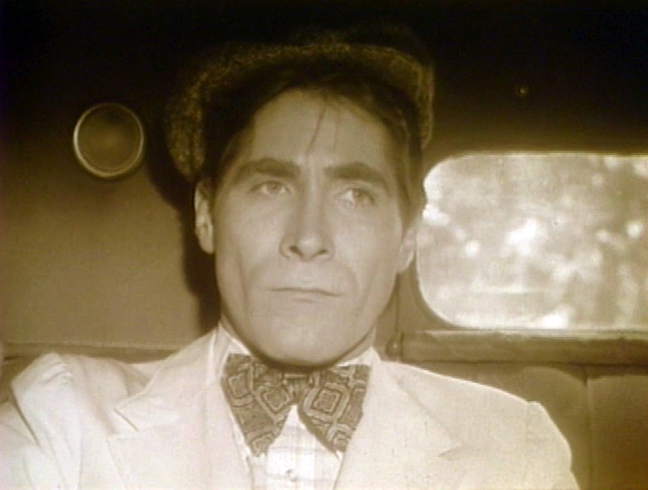 Wade Nichols in ‘Take Off‘ (1978)
Wade Nichols in ‘Take Off‘ (1978)
From an interview in Mr. magazine, May 1978:
“Armand Weston is my favorite director because of the way he works close to his actors and takes care of you from one moment to the next. Carter Stevens is my next favorite because I admire what he can do on a small budget. He really knows how to get mileage out of film. ‘Punk Rock’ (1977) will be a spectacular film and he only had about $35,000 to work with. The ideas in his head come first and he translates them well.”
Carter Stevens (adult film director):
Dennis was one of the sweetest people you could ever meet. I loved him.
When I made ‘Jailbait’ (1977), he was my lead actor. We shot it up in Nyack NY, which was a sort of a mini porn capital for filming in those days. I had this gay make-up artist working on the crew, and after a couple of days, he proudly came to me to announce that he had “turned” one of my actors.
I asked him which one?
He said it was the star, Wade Nichols!
I inquired if he knew that Wade had been a professional call-boy before the films?
The make-up artist looked pained, and said: “Oh that queen! He told me I was his first!”
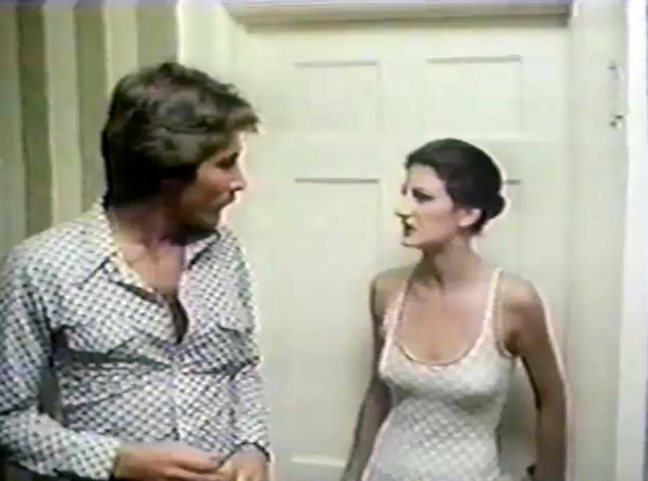 Dennis, and his favorite adult film co-star, Sharon Mitchell
Dennis, and his favorite adult film co-star, Sharon Mitchell
From an interview in Flick magazine, May 1977:
Rustler: What sort of films do you see? X-films?
“Never, unless it’s a screening or something. I love Star Wars. I love older films more; revivals of things like ‘Casablanca’ or ‘Captain Blood’… I collect early jazz recordings of the 1920s. Music is my life.”
In 1978, Dennis traveled to California and Hawaii to appear in one of his last X-rated films, ‘Love You.’ The film was directed by former Hollywood actor and director (and then-husband of Bo), John Derek.
The film featured a small cast, comprising of just Annette Haven, Leslie Bovee, Eric Edwards, and Dennis.
22-year-old Bo Derek was closely involved in the production.
Bo Derek, from ‘Bo Derek A Real ‘10’ in the Daily Press newspaper, October 7, 1979:
It is the most interesting thing I’ve ever done. I raised the money, was involved in lighting, editing, dubbing, and the hiring and firing, while John directed and photographed. We shot it in Hawaii, on a budget of $120,000, with what you might call a reduced crew – John and me, his daughter as script clerk, and two girls as sound and camera assistants. I learned all the basics, much more than I could have in film school.
The film’s release was delayed until 1979 – by which time Bo was creating waves of her own following her breakout role in the Blake Edwards’ hit ‘10’ (1979).
Bo Derek, interviewed in the Daily World newspaper, October 1, 1979:
(‘Love You’) is sexy and erotic. The picture has very explicit sex scenes. It shows everything. It’s the first beautiful erotic, hard core film ever made. I showed it to 600 women libbers in a NOW meeting and they liked it. They said it was not degrading to women. The picture is about love, and you don’t play around with that.
Eric Edwards (adult film actor):
The movie featured a nude wrestling match between me and Wade Nichols. Now, we all knew he was gay. It was common knowledge. I didn’t have a problem with that – or with the scene, and I figured Wade would enjoy it!
However when we started filming it, the shooting seemed to last forever, and John Derek seemed fascinated by it. I wondered if he was gay – which seemed unlikely because Bo was there at his side, watching all the time, so maybe he was bisexual. I don’t know.
The strange thing was that Wade seemed nervous about the whole set up, and I could feel his tension. In the end, we had a private chat, and I just told him to loosen up and go for it. After that, it was fine.
I think he was just concerned that I was concerned!
Dennis was a nice guy. Very respectful. We all liked him.
*
5. Music
Being an adult film star gave Dennis’ life an occasional glamor. But this paled in comparison to the glamor he experienced when he met Jacques Morali.
Richard Posa (Dennis’ brother):
Dennis met Jacques Morali at a bar in New York in 1976 or 1977.
Steven Gaines (writer):
I heard that they met through Dennis’s ad that he had in one of the weekly newspapers.
Jacques Morali was a groundbreaking French disco and dance music singer / songwriter, producer, and arranger, and creator of acts like the Village People and The Ritchie Family.
Born July 4, 1947 in Morocco, where according to legend, he used to be dressed as a girl by his mother, by the age of 13 his family moved to France. Jacques made his start in the music business at the end of the 1960s, writing music for orchestras in Paris, for the Crazy Horse, and for himself as a solo artist.
After not finding the success he hoped for in France, he tried his luck in North America.
In the early 1970s, he met fellow French music producer Henri Belolo.
Henri Belolo (Executive Producer – ‘Like an Eagle’):
Jacques was pitching ideas to me all the time. In 1975, he called from America and said he wanted me to help him create a huge, dance club record. He wanted to adapt the song ‘Brazil’ from a musical starring Carmen Miranda. He wanted it sung by larger-than-life female singers, so he found three singers and called them ‘The Ritchie Family.’
I liked the idea, and I came over to the U.S. That was the start of our partnership.
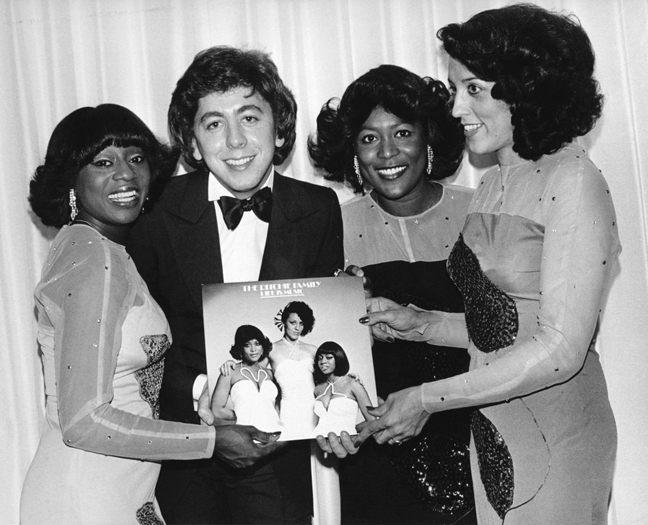 Jacques Morali, with The Ritchie Family
Jacques Morali, with The Ritchie Family
While Jacques’ music career in America was taking off, he and Dennis started a romantic relationship.
Henri Belolo (Executive Producer – ‘Like an Eagle’):
Jacques was openly gay… he never hid that fact.
According to what he told me, Jacques was instantly attracted by this sexy and handsome guy. As he used to say in his heavy French accent… he was always attracted to a good-looking mustache! So obviously, Dennis fit that description. Dennis had a mustache and was very good looking.
Jacques was also excited by the fact that Dennis was a porn star… not only in gay movies but in straight movies! So it was a challenge for him to have an affair with Dennis, and that’s what happened.
Tip Sanderson (Dennis’ friend):
Jacques and Dennis were an interesting couple. Jacques was clearly infatuated with Dennis. Totally in love with him. It was sheer physical attraction. But Jacques wasn’t Dennis’ physical type at all, so perhaps the attraction wasn’t as… mutual.
What Jacques did have in his favor was the music business. The glitz, the scene, the money… and he exploited it to the max. He told Dennis he would make him a star, a big music star. Dennis was seduced by that. I mean, who wouldn’t be?
Henri Belolo (Executive Producer – ‘Like an Eagle’):
Jacques was in love with Dennis, but I don’t know about Dennis, you know? It’s hard to know. I doubt it. Was Dennis attracted to Jacques? Who knows? But the fact that Jacques was a successful music producer definitely helped their relationship.
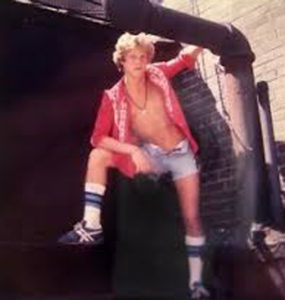 The problem for Dennis was that he was still in love with his boyfriend, Joey.
The problem for Dennis was that he was still in love with his boyfriend, Joey.
Tip Sanderson (Dennis’ friend):
It was sad. In the end, Dennis chose Jacques over Joey. Maybe the allure of fame was more powerful than his feelings for Joey. Either way, Dennis moved in with Jacques. But he continued to see Joey when he could… which Jacques either didn’t know about or didn’t care about…
But after that, Jacques and Dennis were a couple.
Henri Belolo (Executive Producer – ‘Like an Eagle’):
Dennis kept his own apartment, but they lived together just round the corner from me. My place was on East 55 St. between First and Second Aves. Jacques and Dennis were two blocks away at 300 East 56th St. They lived together there for a few years.
Richard Posa (Dennis’ brother):
Dennis told me Jacques was making around $8 million a year – and this was back in the 1970s. He was doing really well. Jacques was very generous with his friends though.
Steven Gaines (Co-writer of ‘Like an Eagle’ and ‘New York By Night’):
I visited Jacques and Dennis in their apartment, and Jacques gave me a tour. He took me to the bedroom, which was really over the top, and everything in it was super-expensive.
There was this beautiful suede headboard – and Jacques said in a thick French accent, “Zees ees where I fist fuck my boyfriend.”
I don’t know what I was thinking, but I said, “But what about that suede headboard… aren’t you afraid of ruining it?”
Jacques looked horrified, and said, “Whaaat? Do you think we’re peeegs?!’
Which kinda reminds me of a joke: How do you make a gay man scream during sex? You wipe your hands on the drapes.
Henri Belolo (Executive Producer – ‘Like an Eagle’):
I was great friends with Dennis, and I liked him a lot. Dennis, Jacques, my wife and I often went out together. We went to Studio 54 and all the discos. We had dinner regularly. My wife liked Dennis because he was a good guy, very soft-spoken, well mannered, and elegant. He was a very good man.
In many respects, Dennis was the opposite to Jacques. Jacques was loud and extravagant, and Dennis was quiet and reserved. I’m sure that Jacques drove him crazy a lot of the time.
Dennis continued to make adult films after he met Jacques. Far from being a problem for their relationship, Jacques was intrigued by the emerging and sexual world of XXX, and he enjoyed Dennis’ stature as a sex star in the industry.
Richard Posa (Dennis’ brother):
They were together for several years. It was through Jacques that Dennis had a disco career. Jacques was putting the Village People together, and at first he offered Dennis a role in the group.
Jacques had attended a costume ball at Les Mouches, a gay disco in Greenwich Village. He was impressed by all the macho male stereotypes portrayed by the party guests. The idea came to him to put together a group of singers and dancers, each one playing a different gay fantasy figure. He formed the group and called it The Village People.
He and Henri Belolo signed a licensing deal with Casablanca Records, one of the most famous disco labels, and the Village People hit the big time with songs including ‘YMCA’ (1978), ‘Macho Man’ (1978), ‘In the Navy’ (1979), and ‘Go West’ (1980). They became one of the most successful acts of the disco era.
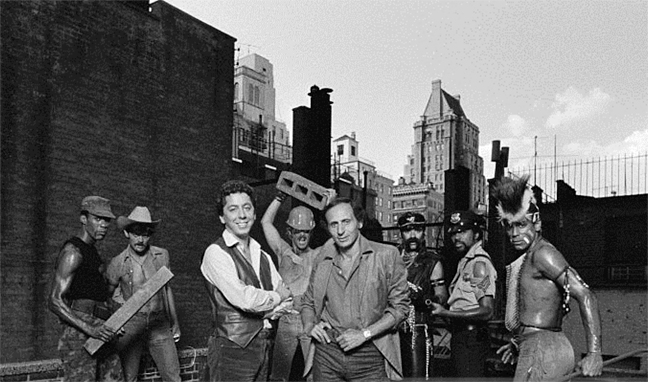 Jacques Morali and Henri Belolo – with the Village People
Jacques Morali and Henri Belolo – with the Village People
Tip Sanderson (Dennis’ friend):
Dennis told me that he and Jacques decided that they would not make him part of the Village People – where he would be only one of five members of a group, but rather they’d hold him back and launch him as a solo star instead.
The two of them carefully mapped out their plan for a music career for Dennis. Dennis was not a big pop or disco music fan, so he had a few reservations, but Jacques was so enthusiastic that I guess Dennis was caught up in the excitement.
Henri Belolo (Executive Producer – ‘Like an Eagle’):
Every time Jacques met someone, he would say, “I will make of you a star, my dear” with his big French accent. Dennis was no exception. Except of course, Jacques was in love with him.
Skip St. James (Dennis’ partner in the early 1970s):
I saw Dennis on and off after our relationship ended. I knew he’d been dating Jacques Morali – who I knew as the creator of the Village People. Then at one point, Dennis disappeared completely for a short while. When he re-appeared, he said he’d been in Philadelphia. He had new teeth and a new nose!
His old nose was a very handsome Roman one. I don’t want to say it was a hook nose… but, you know. When he came back he had a turned-up nose that he said was modeled after mine. I didn’t like his nose at all because I adored his old one.
To be honest, I think he was better looking before the nose and teeth work.
Henri Belolo (Executive Producer – ‘Like an Eagle’):
One day Jacques said to me, “We’re going to make an album with Dennis.”
I told him, “But Jacques, we can’t. He’s not a singer!”
Jacques said, “I know. He’s an actor, but he’s good looking and believe me, we can make him a star. Trust me.”
So we agreed to produce an album for Dennis.
In 1978, Jacques secured a record deal for Dennis with Casablanca Records, and he assembled a selection of songs.
Henri Belolo (Executive Producer – ‘Like an Eagle’):
Jacques and I had different roles. He was the melodist. He was a magician that came with all the hooks in the melodies. I was the one that came up with the ideas for the lyrics. But my English was not too good at that time, so I started to write the song in French or in bad English and then I got the help of Victor Willis, the lead singer for the Village People.
The two strongest songs, ‘Like an Eagle’ and ‘New York By Night’, were written by Steven Gaines, a writer who had penned a pair of biographies – one about former child evangelist Marjoe Gortner, and one of Alice Cooper entitled ‘Me, Alice.’
Steven Gaines (Co-writer of ‘Like an Eagle’ and ‘New York By Night’):
At the time, I was writing about pop music and pop culture for a variety of publications including New York magazine. I’d just written a two-page article about how Jacques Morali had formed the Village People, and how he was selling them like a sports team is sold. And now, he was going on to ‘invent’ somebody else.
Jacques loved the story, and he called me up to say thank you. Then he said he wanted me to write the lyrics for an upcoming album featuring his boyfriend.
Jacques said, “If you write for me, I will make you rich!”
And I wanted to be rich, so I said, “Great, I’ll do that!”
Henri Belolo (Executive Producer – ‘Like an Eagle’):
Normally we didn’t work with other writers, but for some reason Jacques brought Steven in to write for Dennis.
Steven Gaines (Co-writer of ‘Like an Eagle’ and ‘New York By Night’):
A few days later, Jacques changed his mind and decided he only wanted me to do two songs, and he sent me click tracks to work with. The click tracks were just audio clicks to show the rhythm of the song… nothing else. So I wrote the lyrics for ‘Like an Eagle’.
When Jacques heard it, he said that the words were too complicated for people to listen to on a dance floor. I’d done a lot of work on them, and believe me, they weren’t that complicated! Jacques said he would work on them. He did – and in the end, the lyrics were as follows… and please forgive me if I recite them to you:
“Like an Eagle, Like an Eagle, Like an Eagle, Like an Eagle, Like an Eagle, always searching, always wanting, Like an Eagle.”
So he certainly made them less complicated…
The other song I wrote was ‘New York by Night’. It was hard writing lyrics with only a click track, but I wanted to write something that was contemporary about New York, and so I included details like the hustlers on 53rd St. and things like that. Once again, Jacques said it was too complicated. He wanted me to dumb it down, because he said that Dennis couldn’t sing that many words that quickly. But this time, Dennis convinced him that he could handle it, so they kept my lyrics and didn’t change them.
I was mocked for those lyrics at the time, but now people seem to like them.
‘New York By Night’ by Jacques Morali, Henri Belolo, Steven Gaines:
Bushes in the park, shadows moving dark,
Fast romance, furtive glance,
Dancing at Flamingo, watching all the lights go,
Dance with me, a New York melody.
Sitting on a rooftop,
Lovers loving non-stop,
Come with me, come with your fantasy.
This is New York by night,
New York by night,
Filled with glamour, drama, laughter and spice,
Such a pretty city.
New York by night,
This is New York by night,
It’s a galaxy of pleasure and pain.
Dennis Parker – ‘New York by Night’:
Henri Belolo (Executive Producer – ‘Like an Eagle’):
The lyrics of ‘New York By Night’ are fantastic. One of my favorite lines goes –
“At Studio 54 they’re waiting at the door
Can’t get in, just can’t win.”
It captures the moment when we went to Studio 54 every night. We were in the middle of that disco revolution of that time. It was something crazy, short but, my God, so much life, so much happiness. So much enjoyment. We were in the middle of no war, the economy was not too bad, people wanted to go out after Vietnam. They wanted to have a good time. Sex was starting to get liberated, the gays were starting to come out. Everything was exploding, it was a new generation, and of course they did not want to be the old generation that was pop or rock – they wanted to be disco. That’s what it was.
Former adult film actor Andrea True had found success two years before by recording a disco hit whose lyrics referred to her porn career. Similarly, the lyrics to ‘New York By Night’ also referred to adult films:
“On 42nd Street, X-rated is the beat,
See some skin up on the silver screen”
Henri Belolo (Executive Producer – ‘Like an Eagle’):
Before the recording sessions, Jacques made Dennis prepare intensively, taking singing lessons, and practicing a lot. He really made Dennis work hard.
The recording sessions boasted an impressive roster of musicians. Apart from Jacques and Henri, Phil Hurtt was a member of The Salsoul Orchestra, Marty Nelson was an original member of The Manhattan Transfer, and soul singer and session singer Frank Floyd was a member of the group, The Writers.
Henri Belolo (Executive Producer – ‘Like an Eagle’):
We recorded it at Sigma Sound as usual. We also used synthesizers instead of strings, which was quite new for the time. We had the best musicians and arrangers. In fact we used the same rhythm section that featured on the Village People records.
Phil Hurtt (singer, songwriter – ‘Like an Eagle’):
I wrote two songs for Dennis’ album: ‘I’m A Dancer’ and ‘I Need Your Love’.
This is how it went: Jacques would ask the session guys to play something, and they would play around until he liked what he heard. Normally he would get a catchy hook or a chorus that he liked, and then Jacques would call me, and I would come in and complete the song.
I would also teach the vocals to the singer and sing background vocals. That’s how the songs got created.
Alfonso Carey (Bass player on ‘Like an Eagle’):
I’m the bass player that played on all the Village People hits… from ‘YMCA’, ‘Macho Man’, and the rest, as well as The Ritchie Family, Patrick Juvet, and Dennis. In fact, I also wrote the song ‘Why Don’t You Boogie’ for Dennis.
Jacques Morali contacted me and told me to come down to play on his boyfriend’s record.
Jacques was very ‘out there…’ He would let you know in a minute that he was wonderful and gay. He brought Dennis into the studio and we thought he was cool, and much more chill than Jacques.
Dennis’ singing career hadn’t consisted of much more than humming along to his jazz records, so recording an album at one of the premiere studios in New York was a completely new experience for him.
Phil Hurtt (singer, songwriter – ‘Like an Eagle’):
When Dennis recorded the album, the musicians were actually not there most of the time. That was normal. They’d already recorded the basic tracks by then. So when Dennis was in the studio, it was just Jacques and Henri, myself, and the engineers.
I was the only one actually in the recording booth with Dennis because I was teaching him the vocals. If I wrote a song, I’d have to sing it for the artist to learn it, and then I would stand alongside of them until they got it.
I stood with him training him through the song. Every artist I worked with, I did that.
Henri Belolo (Executive Producer – ‘Like an Eagle’):
During the recording sessions, Jacques got upset and frustrated with Dennis. Jacques could be rude with him. I kept telling Jacques, “Relax. Dennis is not a professional singer. You must be patient with him, he’s doing his best. It was your idea to do an album with Dennis, so now you have to learn to work with him. The final result will be good.”
But what amazed me was that Dennis was very calm even when Jacques was angry. Dennis was always calm. I mean, I never saw him excited or shouting or mad.
Alfonso Carey (Bass player on ‘Like an Eagle’):
Dennis had a little talent, but it wasn’t a talent like Victor Willis of the Village People, or anything like that. I, myself, wouldn’t say Dennis was a great singer. I’m not talking down on him, but he wasn’t a singer-singer if you know what I mean. He was definitely somebody who could hold a note, but he didn’t move me with his voice. He did all right, though.
Phil Hurtt (singer, songwriter – ‘Like an Eagle’):
I think Dennis had a better voice than what came across. I think he was misused. I don’t mean this in a disparaging way, but I think if he had been working with a producer who knew how to produce different types of music then he would have done even better.
He was a nice guy though. Quiet and polite.
Henri Belolo (Executive Producer – ‘Like an Eagle’):
Dennis voice was actually pretty good! We had to work around it at times, but that was OK. For instance, Jacques sang certain passages at the same time as Dennis to augment Dennis’ vocals. So on ‘Like an Eagle’ when you hear the high voice sing “ah huhhhh” just after the chorus, that’s mainly Jacques singing. We also used background singers to cover up some parts as well.
But I have to say, honestly, Dennis did his part, and did a great singing job for someone who had no experience.
Carla Bandini-Lory (Assistant Producer – ‘Like an Eagle’):
Dennis was a sweetheart, and he impressed everyone. He was a gentleman, he held open doors, never acted above the support staff – which many other people at that time did.
He was a total pro. He listened, he took direction from Jacques, and he understood what was going on.
Even so, he was always in Jacques’ shadow. Everyone was in Jacques’ shadow. Jacques was always the biggest personality in every room.
Steven Gaines (Co-writer of ‘Like an Eagle’ and ‘New York By Night’):
I went to the studio and I watched them record my songs.
Dennis was very cool, and very low key. I don’t remember a big ego or personality thing about him at all. Jacques was a French queen, quite the opposite… a big flamboyant character. When Jacques was good, he was very, very good, but when he got mean, he was really horrid.
Henri Belolo (Executive Producer – ‘Like an Eagle’):
As Executive Producer, I had overall creative control of the record, and I was happy how it turned out. The whole package was very nice. The photo session of Dennis in New York at night for the back cover of the LP was great.
Neil Bogart, the head of Casablanca Records, liked it and thought it was a very good record. He was excited to release it.
The resulting LP, ‘Like an Eagle,’ was released in 1979 – with Dennis adopting the name ‘Dennis Parker’ to distance himself from the adult film career of Wade Nichols.
Steven Gaines (Co-writer of ‘Like an Eagle’ and ‘New York By Night’):
Just before ‘Like an Eagle’ came out, Jacques told me that a disc jockey was going to break it at a gay club called the Flamingo one night, so I went along with my lawyer. It was a big dance place, and you had to have a membership and all sorts of bullshit just to be there, but it was a really important place to launch a record. There were 1,500 gay guys with their shirts off, completely stoned on ethyl chloride.
Suddenly the song came on for the first time and it was really, really thrilling. People didn’t know it at first but it has that whooshing sound, and it just really, really worked well. I’ll never forget how exciting that moment was… at least until my not-so-brilliant lyrics started.
It got a great reaction, the crowd really loved it.
Richard Posa (Dennis’ brother):
When the record was released, I asked Dennis if the adult films were behind him. Dennis said yes, but he was pleased with the work he’d done nevertheless. He also mentioned that Screw magazine had voted him ‘Man of the Year’ in 1978 – and he got a kick out of that.
Dennis stopped appearing adult films once the record was released. New films featuring Wade Nichols continued to be released, but they had been shot beforehand. ‘Love You’ (1979) was shot just before Dennis entered the recording studio, ‘Blonde Ambition’ (1981) had been shot in 1976, ‘Blue Voodoo’ (1984) was shot at the end of 1977, and ‘Maraschino Cherry’ (1978) had largely been shot in 1977.
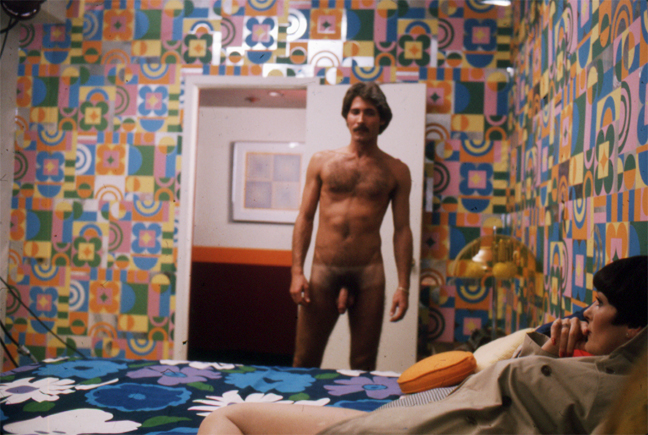 Unpublished photo showing Dennis rehearsing his scene in ‘Maraschino Cherry’ (1978) with Gloria Leonard
Unpublished photo showing Dennis rehearsing his scene in ‘Maraschino Cherry’ (1978) with Gloria Leonard
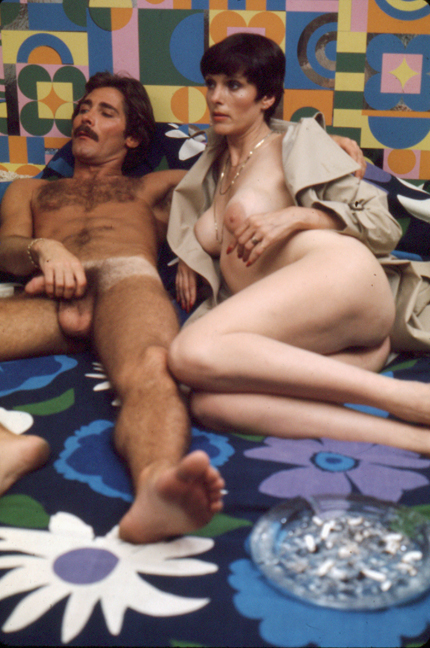 Unpublished photograph showing Dennis, between takes on the set of ‘Maraschino Cherry’ (1978), with Gloria Leonard
Unpublished photograph showing Dennis, between takes on the set of ‘Maraschino Cherry’ (1978), with Gloria Leonard
Tip Sanderson (Dennis’ friend):
Dennis was very relaxed about his pornographic films. No one was pressuring him to stop making them, and he could have continued, but he just didn’t need the money once he got with Jacques and his record came out, so he just stopped.
In early 1979, Dennis made his first appearance on The Merv Griffin Show – where he sung ‘Like an Eagle,’ and appeared alongside Glenda Jackson, David Soul, and Brooke Shields.
Skip St. James (Dennis’ partner in the early 1970s):
I didn’t see much of Dennis after he moved in with Jacques. Then one night, out of the blue, he invited me over for dinner, and he turned on the Merv Griffith show. There he was singing ‘Like an Eagle’ on TV – all dressed up in shiny silver clothes. He’d invited me over because he wanted me there to share it. I was like… holy crap, he’s really… like wow!
Skip St. James (Dennis’ partner in the early 1970s):
I was impressed, although it was strange seeing him sing that kind of music. He hated disco and he hated dancing! Dennis was a jeans and leather guy. He liked corduroys and jeans, and was clearly uncomfortable in that silver lame’ jumpsuit.
I thought he looked ridiculous. And when he smiled… it was like neon on his teeth. They were way too bright.
But he was very proud of it, and I was very proud of him for it.
We stayed in touch, but I never saw him again after that evening.
Steven Gaines (Co-writer of ‘Like an Eagle’ and ‘New York By Night’):
When Dennis premiered ‘Like an Eagle’ on the Merv Griffin Show, I invited a whole bunch of people over to my house. We all watched and suddenly Dennis appeared – and he looked like the tin man from The Wizard of Oz! It was so weird, horrible, really spacey. And he couldn’t really dance or move either. It was very artificial and clumsy. It was so bad that we all started laughing, and we screamed with laughter. There were 6 or 7 people just rolling around on the floor just screaming with laughter because it was so bad.
Dennis went on to make many more television show appearances, including further appearances on The Merv Griffin Show, such as a disco-themed episode on May 3, 1979, in which he appeared with The Village People, The Ritchie Family, Patrick Juvet, and Jacques.
Jacques’ contacts in France also secured a brief appearance in the French film ‘Monique’ (1978), which featured ‘Like an Eagle’ as its theme song.
Henri Belolo (Executive Producer – ‘Like an Eagle’):
We took Dennis to Europe on a promotional tour because we had strong connections with our record companies there. First he went to France, then around Europe. He did many TV show appearances there.
When Dennis was on promotional duties, Jacques would travel with him, but they would concoct elaborate stories for the media to build Dennis’ image as a heterosexual, playboy lady-killer, complete with accompanying pictures showing him embracing a selection of beauties.
James Dunn (Dennis’ friend):
When he came back from his latest European trip, Dennis would joke about the love affairs they’d invented for him. Jacques had so many contacts with women in show business it was easy for them to arrange.
Magazine article (1980):
His first stop was Paris, where Dennis met and promptly fell for a Parisian beauty named Michelle. She was the costume designer for a hot Paris nightspot, The Crazy Horse Saloon. Through Michelle, Dennis met the star of the Crazy Horse show, Lova Moor, and soon the trio packed up and took off for the south of France.
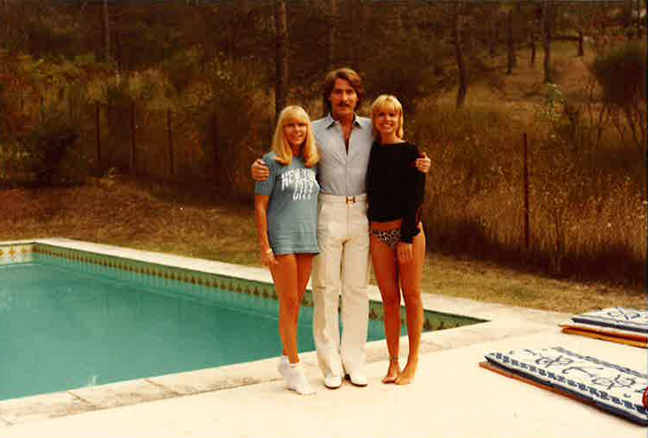 Dennis with ‘girlfriend’ Michelle (left) and Crazy Horse dancer and recording artist Lova Moor (right)
Dennis with ‘girlfriend’ Michelle (left) and Crazy Horse dancer and recording artist Lova Moor (right)
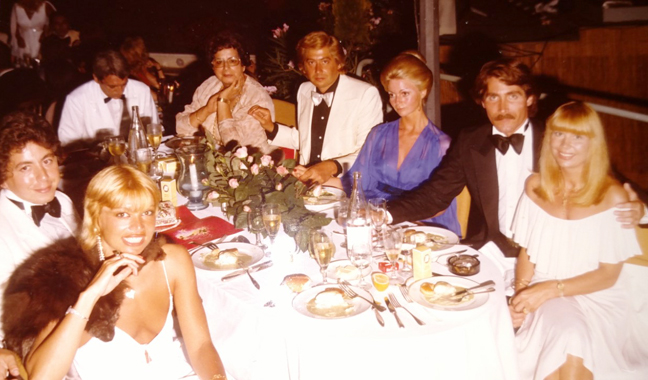 Dennis with Michelle, opposite Jacques and Lova Moor. Jacques mother is at the end of the table.
Dennis with Michelle, opposite Jacques and Lova Moor. Jacques mother is at the end of the table.
What was real however was that Dennis was definitely living the high life. He made regular promotional trips to France, Spain and Italy (where he visited Venice for a ‘Save Venice’ festival), he visited Medina in Morocco and Rio (where he met up with Ursula Andress, John Derek’s ex-wife), and Jacques commissioned a large portrait of him from a renowned artist and his wife in their 14th century chateau in Majorca.
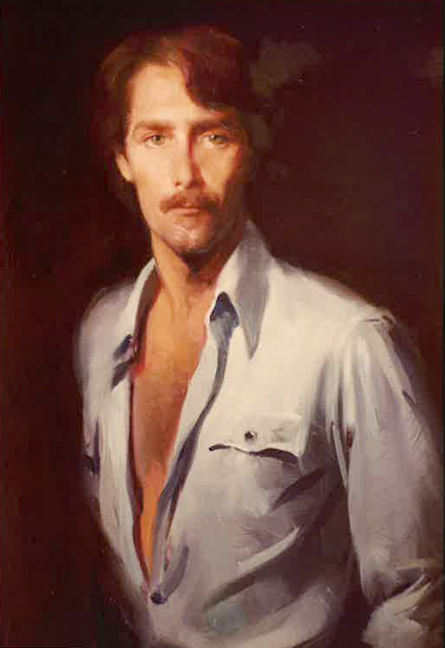 According to Dennis, Jacques paid over $7,000 for this portrait in 1978. It is currently hanging in Dennis’ brother’s living room.
According to Dennis, Jacques paid over $7,000 for this portrait in 1978. It is currently hanging in Dennis’ brother’s living room.
Carla Bandini-Lory (Assistant Producer – ‘Like an Eagle’):
After the record came out, I continued to see Dennis. I worked at Sigma Studios, which was at 1697 Broadway on the 9th and 10th floors, and Studio 54 was right around the corner. When Dennis was in the city, he used to come over in the early hours, after going to Studio 54, and he and Jacques would tell me all the latest gossip from the club scene. He was hilarious.
James Dunn (Dennis’ friend):
For many people, Dennis became a great sex symbol after his record hit. People – men and women – would go wild over him. I thought he had a kind of artificial look and it just seemed weird to me. But I can tell you one thing: I knew a guy who went to bed with him. I asked him, “What was it like?”, and he said, “Oh my God… I don’t know even what he did to me. It was incredible.”
Horace Ott (strings and horns arranger on ‘Like an Eagle’ LP):
After working on the record, my wife Gloria and I went out to Long Island with Jacques and Dennis. They were clearly a happy couple. Dennis was fun, a real gentleman.
A few months later, we were down in Virginia at a wedding, and we found ourselves sat at a table with Dennis’ mother! She even had a copy of Dennis’ album with her and was showing it off to people. She was very proud of Dennis and his music success.
In 1979, Jacques Morali and Henri Belolo teamed up with Allan Carr to make ‘Can’t Stop the Music,’ a musical comedy that was intended to be a pseudo-biography of The Village People, though it bears only a vague resemblance to the actual story of the group’s formation.
Henri Belolo (Executive Producer – ‘Like an Eagle’):
Jacques pushed really hard to have Dennis star in the movie, but for some reason, Allan Carr was jealous about Dennis. Allan like to fool around young and good-looking boys, and maybe Dennis was just getting too much attention. Either way, he did not want Dennis in the movie. So Jacques and Allan had a huge ego fight. I had to fly to California to mediate in the middle of shooting.
In the end, Dennis was not in the movie, even though he was included in all the promotion and premiere parties.
Towards the end of the 1970s, Dennis and Jacques’ relationship started to cool. They remained friendly, but eventually Dennis moved back into his apartment on East 38th St where he started living with a new partner… who was his former boyfriend, Joey Alan Phipps.
James Dunn (Dennis’ friend):
Dennis always had a thing for Joey, even when he was with Jacques. I guess he never let Joey go. They started being a couple again.
*
6. ‘The Edge of Night’
According to friends, Dennis was never interested in recording a follow-up to ‘Like an Eagle’. He’d enjoyed the limelight, the glamor, and the money while it lasted, but the disco scene wasn’t for him. When he split up with Jacques, he started concentrating on acting – and this time he auditioned for mainstream parts.
Richard Posa (Dennis’ brother):
Dennis told me he got an audition for ‘The Edge of Night’ without any help from Jacques. He went to a casting call for a role as an extra; the producers liked him and they offered him a full recurring role as Police Chief Derek Mallory.
‘The Edge of Night’ was an American television mystery series that was produced by Procter & Gamble. So many of the early sponsors of serials had been soap manufacturers like Procter & Gamble, Colgate-Palmolive, and Lever Brothers, that the media called these shows ‘soap operas’.
Rob Foy (Production assistant on ‘The Edge of Night’):
‘The Edge of Night’ wasn’t really just a soap opera. It was a hybrid of a crime drama with some of the elements of a melodrama. So you had the cops, forensics, and attorneys dealing with cases, at the same time you have romantic, marital, and family issues. It was very successful for decades.
‘The Edge of Night’ debuted on CBS on April 2, 1956, and ran as a live broadcast on that network until November 28, 1975; then the series moved to ABC, where it aired from December 1, 1975, until December 28, 1984. In total 7,420 episodes were produced.
Rob Foy (Production assistant on ‘The Edge of Night’):
It was Erwin ‘Nick’ Nicholson that hired Dennis. He was the long-standing producer for the show. He was smitten with Dennis, and loved him from the start. He was like a mentor to many of us, and particularly someone like Dennis.
Dennis appeared in 142 episodes of the daytime soap opera – one of the most frequently-appearing actors in the TV series’ history.
On October 30, 1979, Dennis made his first appearance on the ‘The Edge of Night’ (he appears at the 7 min 50 sec mark):
‘The Edge of Night’ was filmed on the seventh floor of a nondescript brick building at E.U.E. Studios at 222 East 44th Street between 2nd and 3rd Avenues.
Sharon Gabet (Actress on ‘The Edge of Night’):
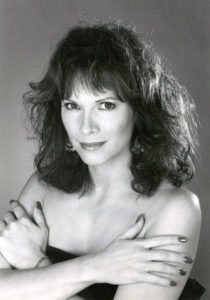 I worked with him all the time. My character was engaged to his, and was using him terribly in the script. Poor Dennis! He was so good on that show.
I worked with him all the time. My character was engaged to his, and was using him terribly in the script. Poor Dennis! He was so good on that show.
The production was unique in that it was a half hour show. We would all shoot at the same time on the set as opposed to waiting in your dressing room until your scenes were up. We shot it like it was live. So the regulars all became very close friends.
And I have to say, Dennis was an excellent actor. He really was. That was not an easy part to play. There was a lot of acting, but he managed to be sensitive and manly at the same time. He was just really, really good in that part.
Larry Engler (puppeteer on ‘The Edge of Night’):
I heard that Dennis’s past as an adult actor had been leaked to the producers, so Dennis took it upon himself to call a meeting with them. He told them about what he’d done. The top producer at the time, Nick Nicholson, told him he was doing a great job and that it didn’t matter. He should just keeping going. Nothing was going to change that.
Richard Posa (Dennis’ brother):
Dennis told me that the producers of ‘’The Edge of Night’ received a few complaints in the early days, because of his XXX past. The producers liked him though and stood by him.
Rob Foy (Production assistant on ‘The Edge of Night’):
The way it was handled was quite secretive. Proctor & Gamble were involved and the rumor was that initially they were unhappy with the situation. But Nick Nicholson evidently stood firm. He was a formidable character: Under his guidance, ‘The Edge of Night’ got only the second Emmy ever given for a daytime drama. He won the day, and Dennis stayed.
Sharon Gabet (Actress on ‘The Edge of Night’):
After that, the producers were quite protective of him. We all knew about his adult film career because the films were frequently running nearby in Times Square at the time! When we first found out about his past, we’d go there and just look at the marquees. We all loved it. We thought it was hilarious.
That was another thing about The Edge of Night: No one got coddled on that show. Nobody. Everybody made fun of everybody. I’ve never laughed so much working in my life like on ‘The Edge of Night’. We really were great friends. Dennis certainly got a lot of teasing by the entire set, but he was always a gentleman. I thought he was such a nice guy.
And the writers would play along too. They’d put the name ‘Wade Nichols’ into the scripts! That was their joke all the time. Maybe it was just for dress rehearsal; I don’t know if it was ever used but it was hysterical.
You could tell when you talked to him about his past that he was so proud of his adult film work. We got a kick out of that. He was not ashamed at all. He felt he did the best he could in every role that he had. He was very humble but very proud of his work. I mean, he was a star! He was a porn star!
Richard Posa (Dennis’ brother):
My mother was very proud of Dennis’ soap opera success. She kept scrapbooks of all the articles and pictures that she could find of him.
Carter Stevens (adult film director):
My daughter hit puberty just when Dennis was becoming successful on ‘The Edge of Night’. She had an enormous crush on him. I’d stayed in touch with him so I mentioned this to him, and a few days later a four-page letter arrived with half a dozen signed publicity shots for her. He was that kind of guy.
Sharon Gabet (Actress on ‘The Edge of Night’):
The producers would play his song ‘Like an Eagle’ on the set. We would all just roar. The video for that song is just so wonderful and hilarious.
Dennis played along. He was very witty, extremely intelligent, and really funny. Yes, he was vain too, but what actor isn’t? Are you kidding? Come on. Everyone would fight to get to the mirror. We teased him about it all the time.
He also had a wonderful partner. They were just a joy. I went over to dinner at their place a number of times.
Richard Posa (Dennis’ brother):
Dennis seemed very happy. His apartment was near this place called Bide-A-Wee Animal Shelter, which was a pet welfare organization. He loved animals, so he’d go there to play with them and talk to the people that worked there.
Dennis became active in fund-raising activities for Bide-A-Wee, arranging functions and making personal appearances, as well as getting involved in other causes like raising money and awareness for autistic children.
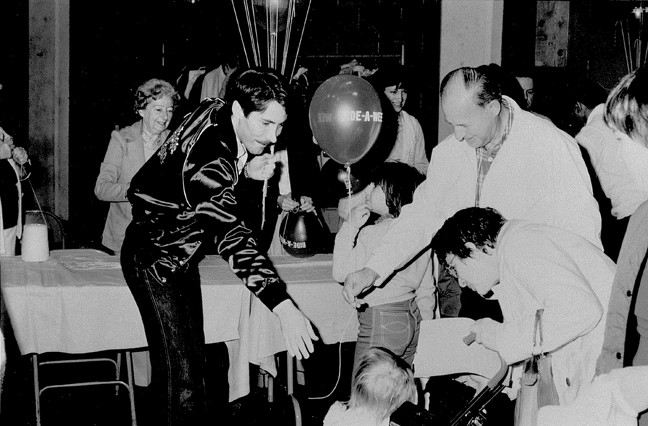 Dennis at a Bide-A-Wee fundraiser
Dennis at a Bide-A-Wee fundraiser
Richard Posa (Dennis’ brother):
His life was good, and he tried to persuade my mother and I to move back to New York to be closer to him, where he was living with his boyfriend, Joe.
In 1980, Dennis got Joey an acting part in ‘The Edge of Night’ – as a puppeteer.
Larry Engler (puppeteer on ‘The Edge of Night’):
I taught Joey how to use the puppets. I was told that I was too old to get the part myself, so they brought Joey in.
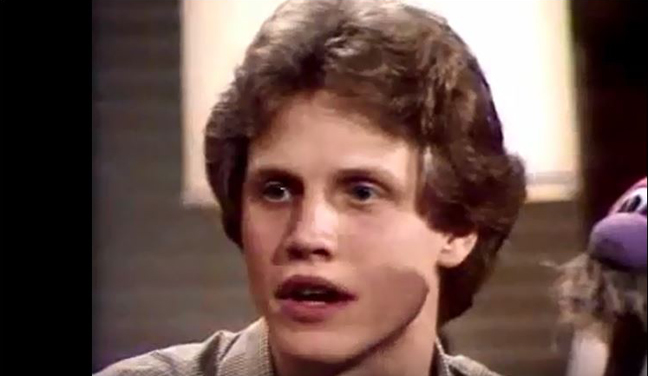 Joey Alan Phipps in ‘The Edge of Night’
Joey Alan Phipps in ‘The Edge of Night’
Joey appeared in 23 episodes of the soap in mid-1980 before being replaced. Rumors circulated about the reason for his dismissal, but most people involved insist he was just a bad fit.
Another actor was brought in to take Joey’s character’s role.
Larry Engler (puppeteer on ‘The Edge of Night’):
I thought that Joey was let go because he just didn’t click with the production. I didn’t hear anything else.
The funniest thing was the way that Joey’s exit was handled on the show. Another actor was immediately cast in Joey’s place, and he suddenly appeared on the show despite not looking anything like Joey! There was no explanation, no plot device to account for it, no nothing.
Joey didn’t have any significant acting roles after ‘The Edge of Night’, his only role of note coming as an understudy in Robert Altman’s Broadway revival of ‘Come Back to the 5 & Dime Jimmy Dean, Jimmy Dean’, which featured Karen Black, Cher, and Kathy Bates.
David Ellen (friend):
I met Dennis at a record store in the early 80s. I loved traditional jazz records and I saw that he had an armful of them that he was going to buy, so we struck up a conversation. I invited him back to my place and we hit it off, and we had these long conversations – swapping stories about the early jazz and bluesmen.
I didn’t know he was on TV or that he was gay. He just told me he was an actor. It was only when I introduced him to a girlfriend that she told me he was a soap star. It turned out all the women I knew were madly in love with him.
Sharon Gabet (Actress on ‘The Edge of Night’):
We would go out dancing together. He was a celebrity. In fact, there was a disco contest for soap people, and Dennis was my partner.
From ‘Shows ‘Em How To Boogie’, United Features, 20 December 1980:
The soap stars were sweating blood. The tension was feverish. The competitiveness was boiling. The event was the ‘ABC Soap Bubble Boogie: Daytime Stars in a Disco Dance-Off.”
It was the routine of Dennis Parker and Sharon Gabet that really got down to the ‘fun gutter’. Garbed in leather, vinyl and ‘el cheapo’ leather skin tights, Dennis and Sharon performed a quasi-Apache dance with fake claps and rough-house antics. As one observer noted, “It’s a good thing the ABC censor isn’t here. This stuff would end up on the cutting room floor and bring a massive coronary to image-conscious executives.”
Sharon Gabet (Actress on ‘The Edge of Night’):
We dressed up in the most hilarious outfits. Wild disco. I had silver skintight pants and some leopard skin top. He wore skintight leather pants. We choreographed this just wild dance. And we won the whole thing!
Sharon Gabet (Actress on ‘The Edge of Night’):
We also had an ‘Edge of Night’ softball team. There were a lot of very athletic guys on the crew and in the cast. Dennis would show up in these tight shorts… and an ascot! He would be there swinging a bat – with his ascot. It was hilarious.
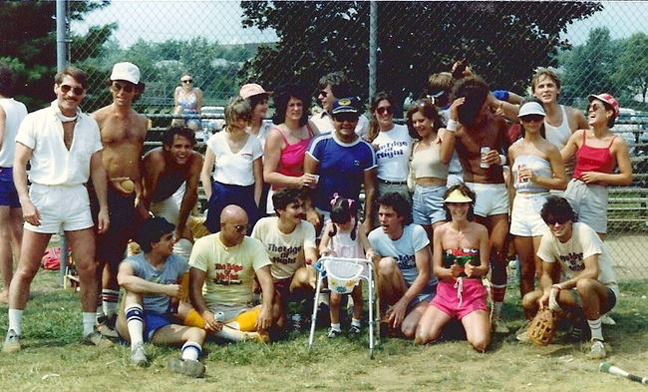 ‘The Edge of Night’ software team, with Dennis on far left
‘The Edge of Night’ software team, with Dennis on far left
Andrew Rubinstein (friend):
He was a very modest guy. I’d known him a couple of years before he even told me that he had had a hit record. He was amused by it. When we hung out, we’d smoke joints and talk and listen to his extensive record collection. When it came to music, he knew what he was talking about.
And the joints we smoked?! The joints he rolled were the biggest I’ve seen. They were like baby’s forearms…
David Ellen (friend):
Dennis’ life slowed down – in a good way, and he seemed happy. He loved the life of being a regular and recognizable TV actor on a show like ‘The Edge of Night’.
Larry Engler (puppeteer on ‘The Edge of Night’):
Working on ‘The Edge of Night’ was great – it was a real family and people were great to each other. Dennis was a key part of that happy ensemble.
Dennis features several times in this ‘Edge of Night’ blooper reel (see the 12:30 mark.)
From an interview in 1982:
“I couldn’t have been more pleased than when I landed the role on ‘The Edge of Night’. I had a wonderful time traveling around the world in the fast lane but I wasn’t happy with the work I was doing. The kind of music that’s popular today, the kind the record company wanted me to do, just isn’t my kind of music.
I’m still singing – but I’m singing blues and jazz, not disco. Plus the role of Derek Mallory is a plum, it’s getting more involved and intense all the time.”
Andrew Rubinstein (friend):
Dennis wasn’t crazy ambitious. I think he would have been happy being a daytime soap actor for the rest of his life. And he could have found work forever doing that. At the same time, he started to be curious about whether he could make it as a film actor. Once he made a name for himself on TV, he started to think about auditioning for bigger parts in movies. He looked at rugged actors like Harrison Ford, and thought… why not me?
*
7. The End
Richard Posa (Dennis’ brother):
In the spring of 1984, Dennis called and said he wasn’t feeling well. He was having very bad night sweats and felt weak. He took some time off ‘The Edge of Night’. When he returned to the show, they were careful to shoot around his frailty. They had him sitting at desks. They did their best to cover up his physical deterioration.
Sharon Gabet (actress on ‘The Edge of Night’):
It was very, very sad because no one knew he had AIDS. To be honest, no one really even knew what AIDS was then. We all noticed something was wrong, of course, because he started losing a lot of weight. He looked sick. He was white as a sheet. He was losing energy. I think the word on the set at the time was that he had mono. He never said anything about it. He was quiet about it.
He started getting grumpy. We all felt terrible later because we were mean to him. No one, like I said, nobody got away with anything, so we would just say, “Oh, come on, Dennis. Stop being so grumpy!”
Richard Posa (Dennis’ brother):
Dennis was treated at the Cabrini Medical Center near where he lived in mid-town Manhattan. My mother went to see him in New York when he was sick.
Dennis’ partner Joey tended to him throughout his illness.
Sharon Gabet (actress on ‘The Edge of Night’):
Recently I watched the final 18 months of the show. I hadn’t seen it in over 30 years. And to watch Dennis’ deterioration on camera was shocking. It was so clear. His suits would hang off him.
I remember it was just awful to see him on the set. He just sank. He had no energy. Now when I look back, it’s pretty evident to me that the man was dying. He would just have enough energy to give his lines and then you would find him asleep in the chair or laying on one of the couches. He just couldn’t do it anymore. They kept cutting his part back.
There was some talk that came out that really upset me – where people quoted me saying, “Oh, I was pregnant, and I wouldn’t let Dennis near me, let alone kiss me.” It is just complete and utter bullshit. I adored him.
It was also a very rough time for ‘The Edge of Night’ as it proved to be our last year. No one knew how fast we were going down because we were losing our affiliates. We were the only show on ABC that wasn’t owned by ABC. They hired a new writer, and that didn’t turn out so well. The producers were really fighting for their lives.
By now, Dennis was unable to continue working on ‘The Edge of Night’, and his character was written out of the show. His last episode aired on October 18, 1984, just 12 days shy of his fifth anniversary of his first air date on the show. (His last scene is at the 16 min 10 sec mark).
Sharon Gabet (actress on ‘The Edge of Night’):
There was just so much going on that Dennis got lost in the drama of everything else. His character just had this mysterious disappearance. You never saw Chief Mallory again.
‘The Edge of Night’ was cancelled a few months later.
Skip St. James (Dennis’ partner in the early 1970s):
I wasn’t in close contact with Dennis towards the end. I saw a clip of ‘Edge of Night’ before he had to leave. He looked so bad. I didn’t visit him because my friend Tony said Dennis didn’t want anyone to see him the way he looked.
Henri Belolo (Executive Producer – ‘Like an Eagle’):
Poor guy. AIDS. That was a horrible time. I was living in New York. We didn’t call it AIDS, we called it Kaposi’s sarcoma. We didn’t know what was happening, and it was frightening.
Richard Posa (Dennis’ brother):
On his 38th birthday in October 1984, he told me he was determined that this would not be his last birthday. He said he would have other birthdays.
He died three months later to the day on January 28th, 1985. He died in the same rent-controlled apartment in New York where he’d been living since the late 1960s. He did not kill himself as some have suggested.
I have a photo taken of him on his deathbed. It was so sad.
Skip St. James (Dennis’ partner in the early 1970s):
Tony called me up and said that Dennis had shot himself. That was the rumor for a time. There were so many conflicting stories.
Whatever the truth is, I’ll always remember and cherish our time together. Like I say, he was a good man.
Henri Belolo (Executive Producer – ‘Like an Eagle’):
There was a mystery about the way he died. I mean, we know that he caught AIDS. But some people say that he died because he shot himself with a gun. Perhaps it’s because they want to create more drama, who knows?
Sharon Gabet (actress on ‘The Edge of Night’):
I was giving birth when Dennis left the show. Then the producers called me up a week after I had the baby and said, “Can you come back and just shoot the final two weeks?” When I got there, they gave me the news that Dennis had died. The words AIDS were never used. No one knew about it.
It ended up that two other of our dear friends on the show suffered the same fate. Joel Crothers, who I spoke to the last few days of his life, was in L.A. at the time. He called me to say goodbye. Irving Allen Lee, who was the other police detective, Calvin Stoner, also passed. All three of them died of AIDS within a year or two. It was just horrible.
Variety’s obituary – February 6, 1985:
Dennis Parker, 38, actor, who for the last five years played Police Chief Derek Mallory on the ABCTV soap opera “Edge of Night,” died Jan. 28 in New York after a brief illness.
Born in Manhattan, Parker grew up in Freeport, Long Island. He attended the Philadelphia Museum College of Art, where he concentrated on pottery and furniture design and had his first taste of acting when, while still a student, he won a role in a touring company production of ‘The Trojan Women.’ After graduating, he returned to his native New York and studied acting at New York U. and the H. B. Studio.
Parker was also an accomplished singer and instrumentalist, and several years ago toured Europe on behalf of an album he made for the Casablanca label.
He was an avid animal lover, and devoted a great deal of time working in their behalf.
Survivors include his mother and brother.
Tributes also came from his fellow actors.
Sharon Gabet (actress on ‘The Edge of Night’):
He was so good and such a sweetheart, and of course none of that made any difference in the end. He was a dear friend. I loved him.
After the huge successes of the 1970s, Jacques Morali’s career had gone quiet for a few years. His last successful production work had been in 1983 with Break Machine and 1984’s Eartha Kitt album, ‘I Love Men.’
In 1990, several years after Dennis’ passing, Morali gave a rare interview.
Jacques Morali (Producer – ‘Like an Eagle’, interviewed in 1990):
I think that the respect (for the work I’ve done) will come one day. Perhaps after I die. I’ve had AIDS for five years, and my most recent hits, with Break Machine and Eartha Kitt, were back before I was ill.
I lost too many friends. When Dennis died, it completely shook me.
What’s your happiest memory?
Mmmm… (he pauses). Dennis Parker. I was completely in love with him. It was Dennis who sung ‘Fly Like an Eagle’.
Henri Belolo (Executive Producer – ‘Like an Eagle’):
After Jacques split up from Dennis, he had a big love affair with a guy named Harold Striegel who was a bartender in Los Angeles. Harold was a young German, mustache, very good looking – just Jacques’ type. They lived together for six or seven years, but Harold died dramatically as well when he caught AIDS too.
Jacques Morali died of AIDS in 1991. He was buried in Saint-Paul-de-Vence, in France.
Richard Posa (Dennis’ brother):
After Dennis’ death, Joe Phipps went to live in California. Somewhere in the early 1990s, he contracted AIDS. This was a very different era than when Dennis had contracted the illness. By now, cocktails of drugs were available which could have saved him. Unfortunately, Joey had some other kind of health issue and his body rejected the new drugs.
Joey tried a variety of alternative cures. The costs were high, and he declared bankruptcy in 1995.
Joey passed away on December 6th, 1996.
*
Epilogue – New York, 2010:
Several decades later, Radley Metzger stood on the same spot where he had shot the kitchen scene with Wade Nichols for his film, ‘Barbara Broadcast’.
The surroundings were identical to how they looked in 1976.
Radley seemed amused by the interest in the scene he had devised and shot years before. He revealed an unusual combination of pride and modesty.
Looking around, he said: “You can never tell what’s going to work on film. Not even after you’ve shot it. You have little idea. It’s only when you get back to the editing suite that you see if you’ve captured something special.
“When I started to edit the footage, I was happy that scene worked so well. And people still contact me today about it. I still get letters about it.
“Of course, I owe it all to the actors, Wade Nichols and C.J. Laing. They made it very easy.”
He paused.
“Wade Nichols. I haven’t thought about him for a while. He died of AIDS, I think. I don’t know much more about him. He seemed to be an interesting man, but he was such a mystery.
“I wish I’d known more about him.”
*
The music of Dennis Parker lives on. Here is a selection of tracks that sample ‘Like an Eagle’:
Par-T-One vs INXS – I’m So Crazy (2001):
Tomcraft – Boogie Nights (Like an Eagle):
Teenage Mutants – Elle (Original Mix):
Dead Rose Music Company, “Nutkins”:
Linkwood & House Of Traps – Barely Eagle:
*
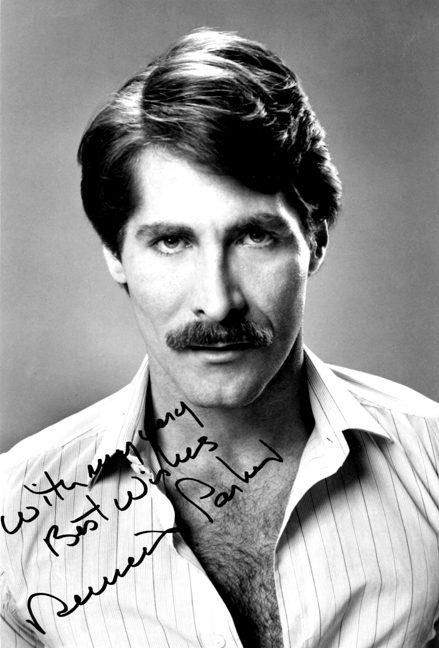
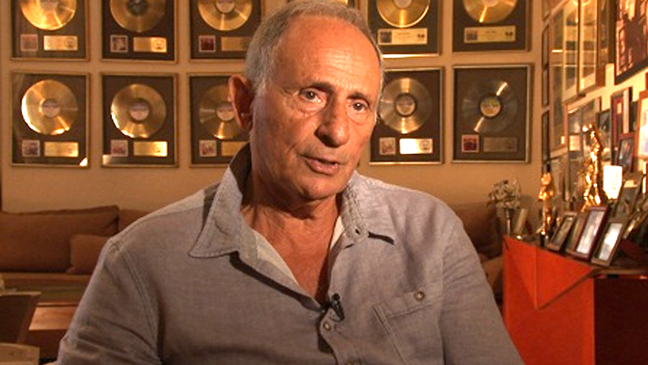
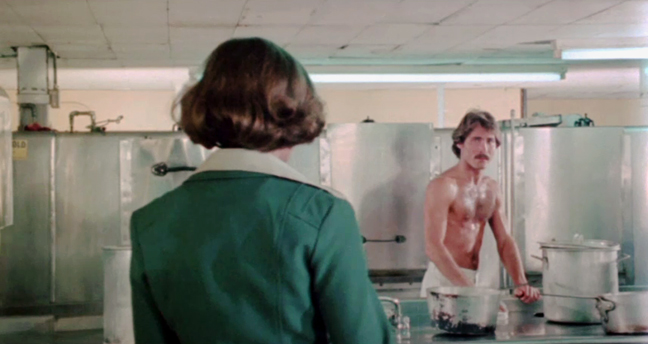
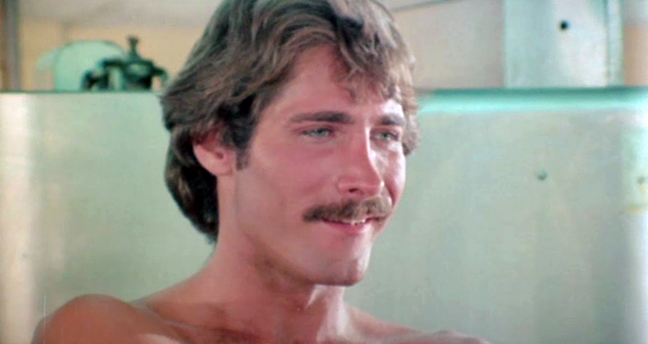
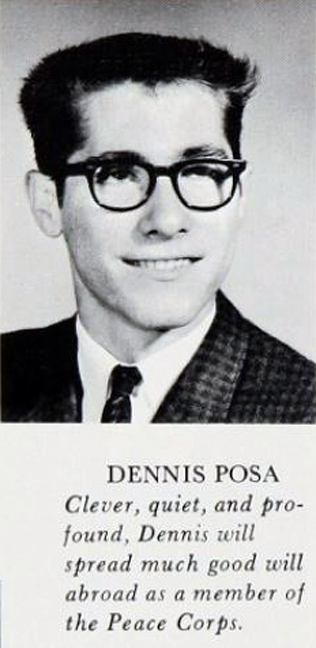
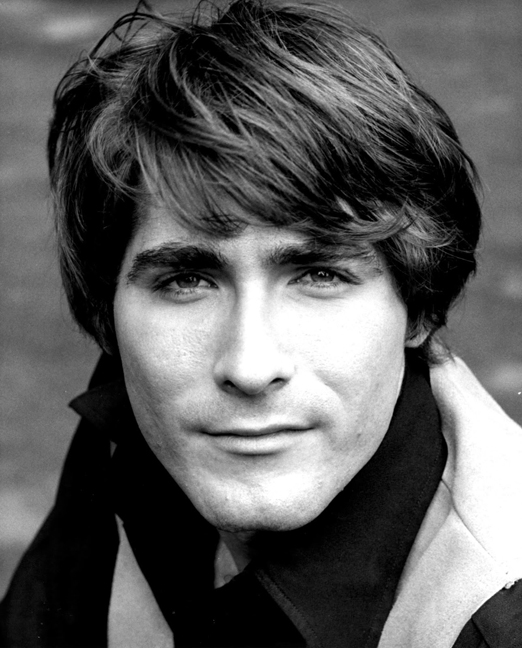
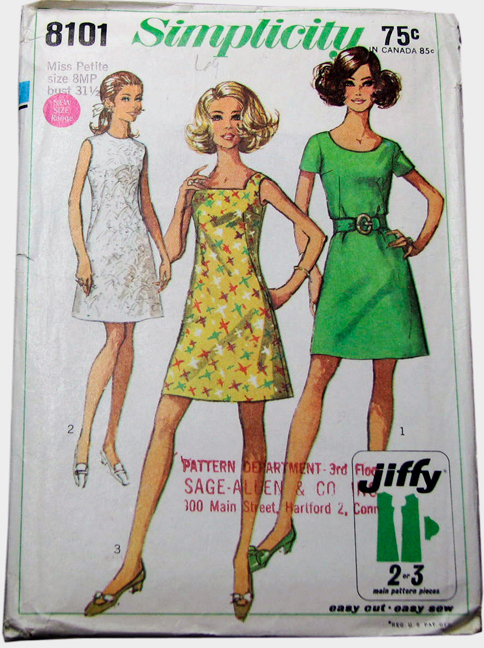
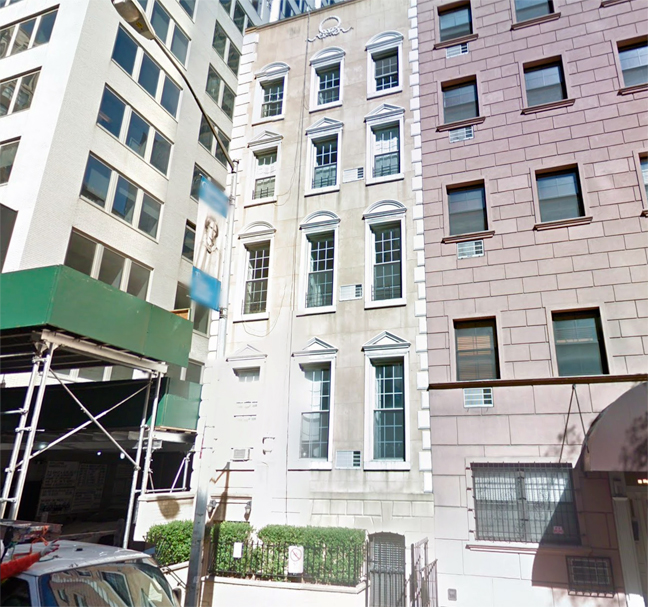
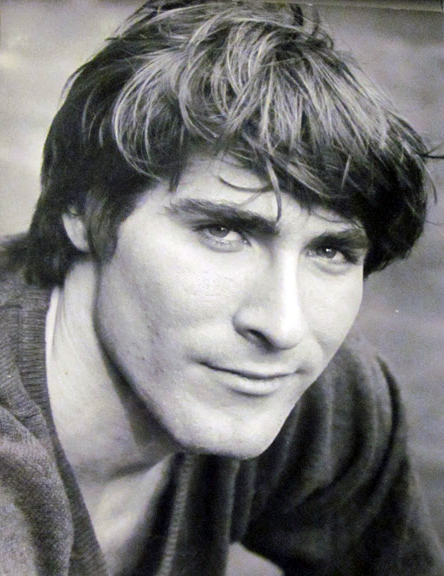
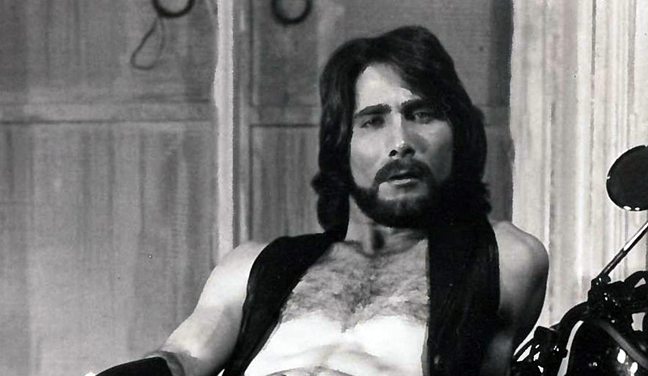
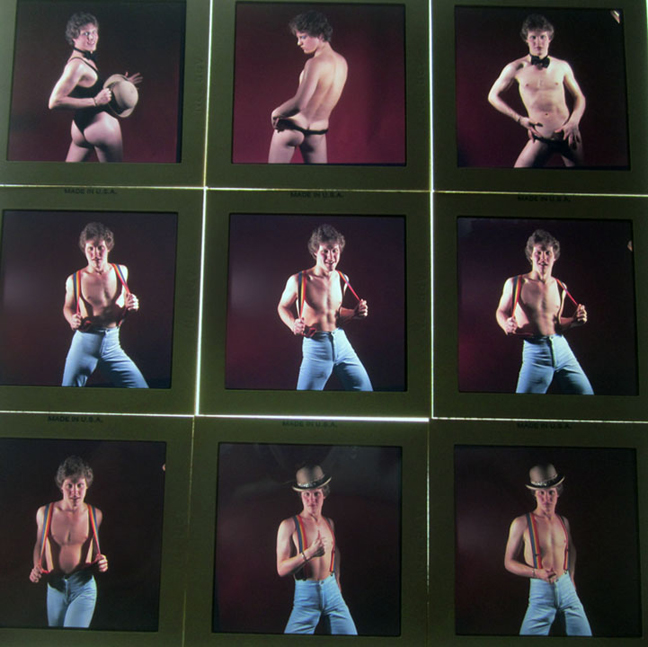
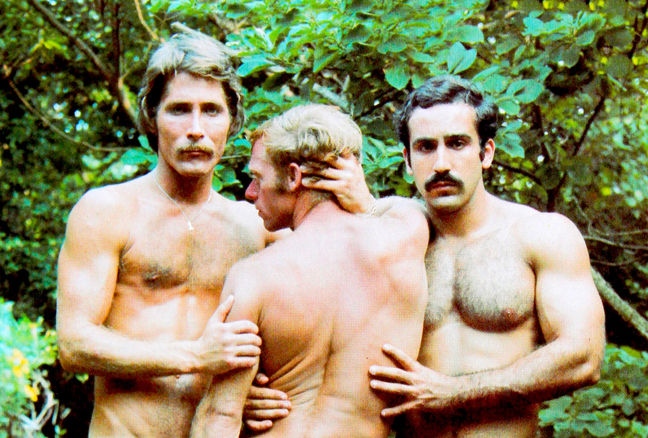
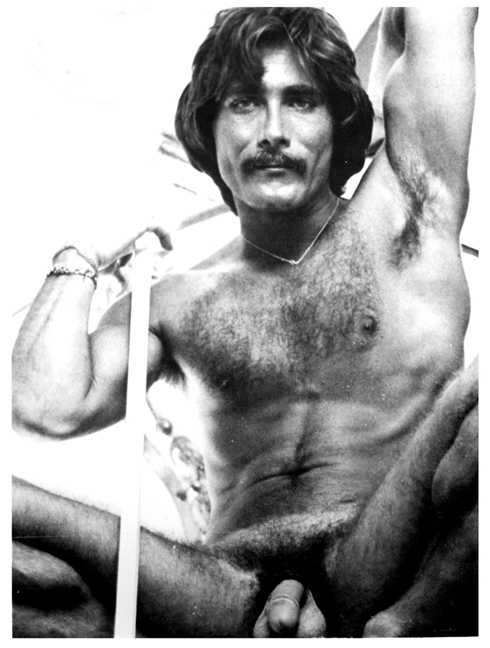
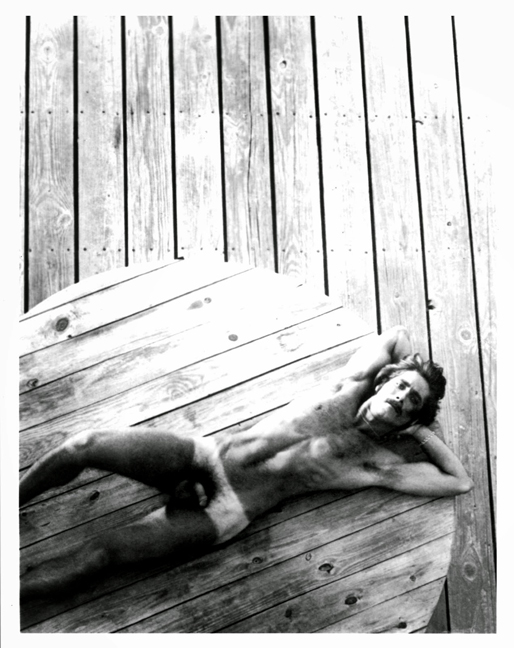
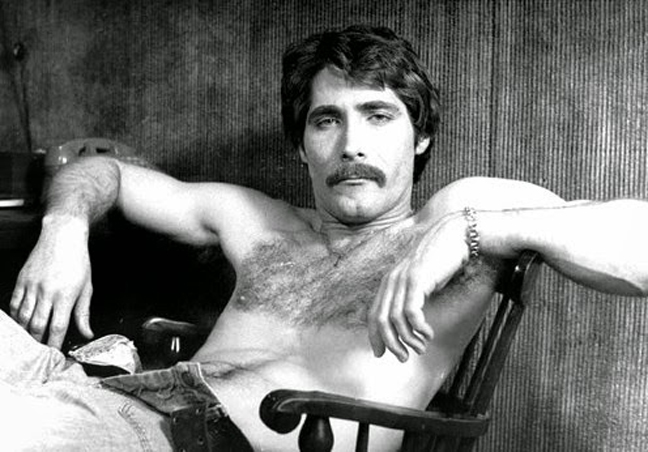
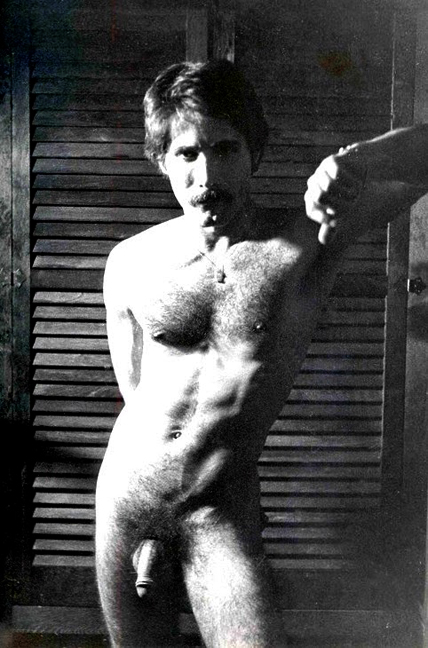
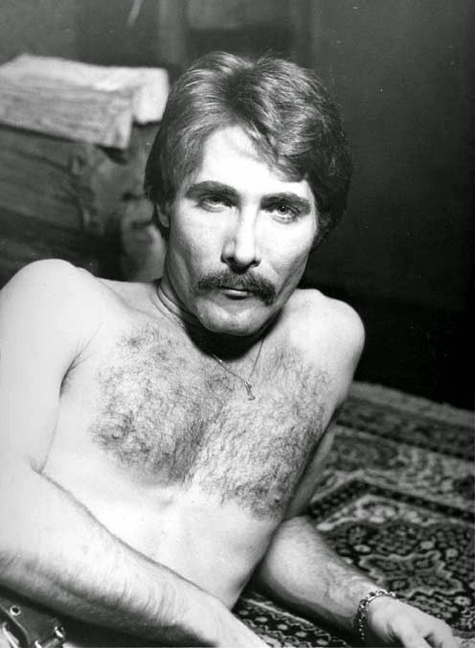
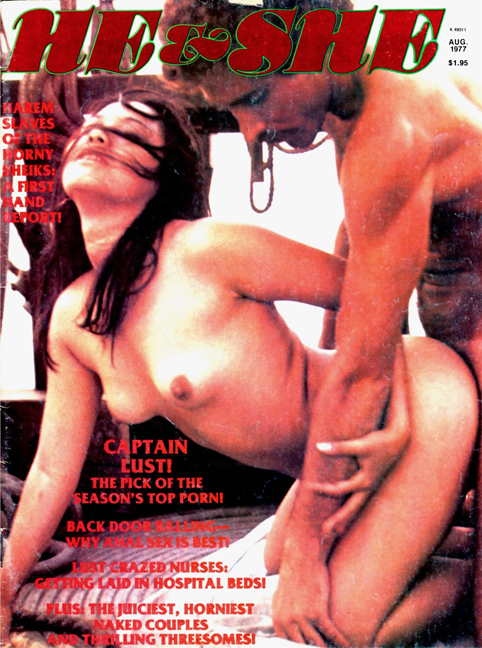
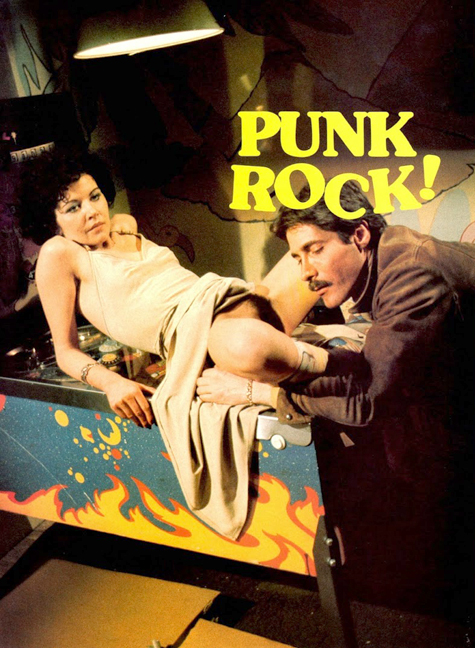
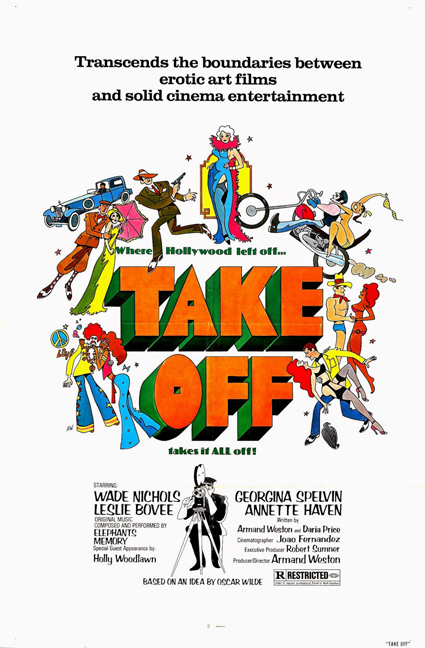
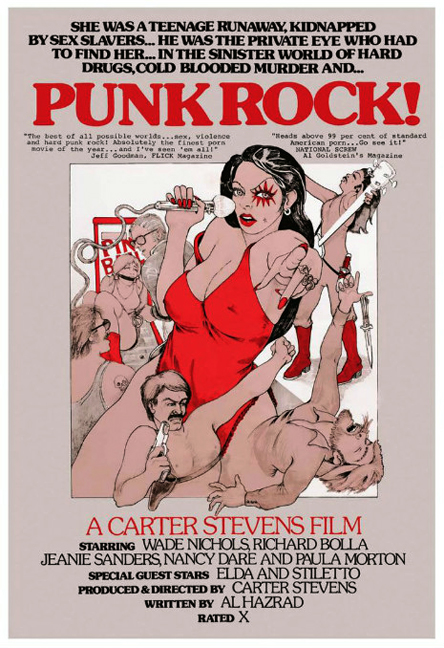
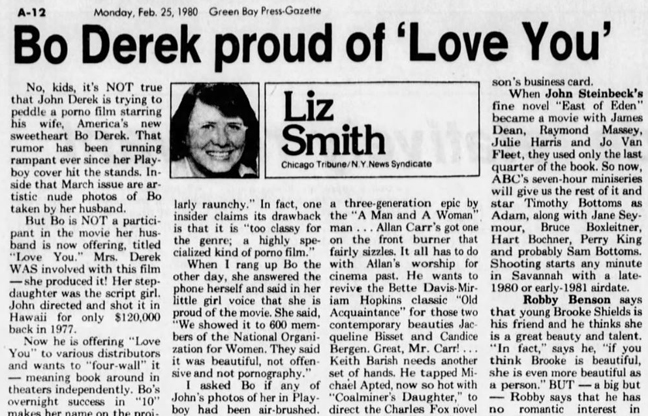
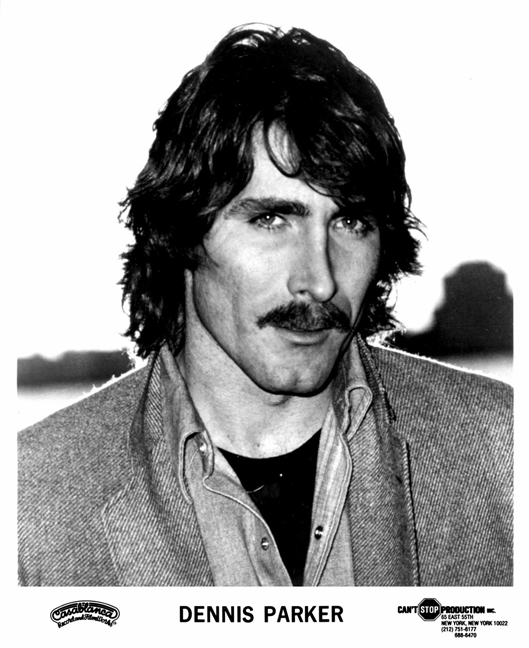
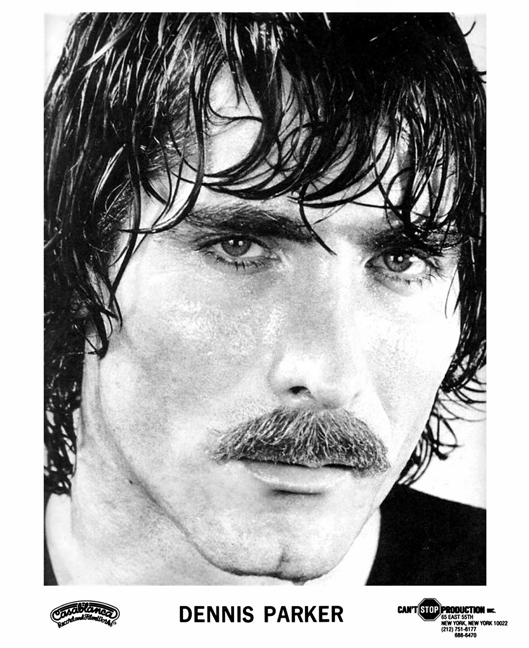
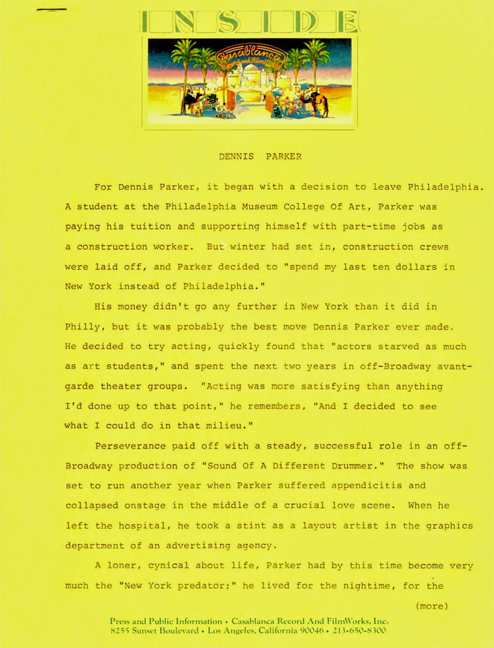
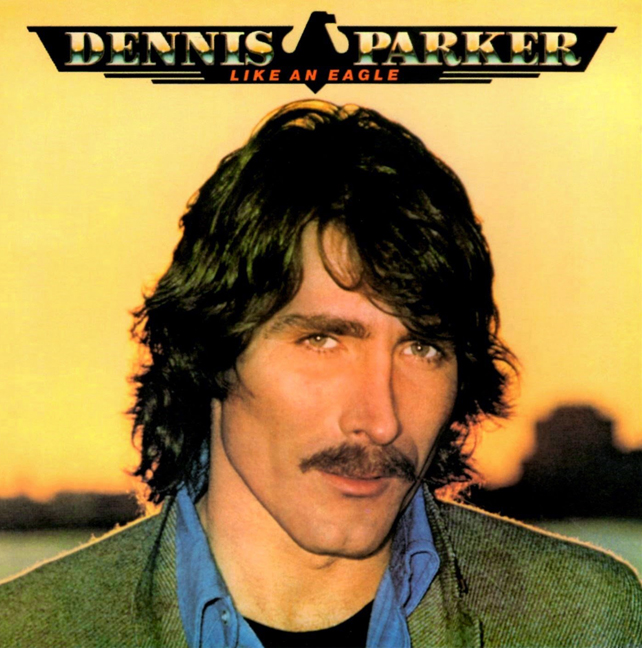
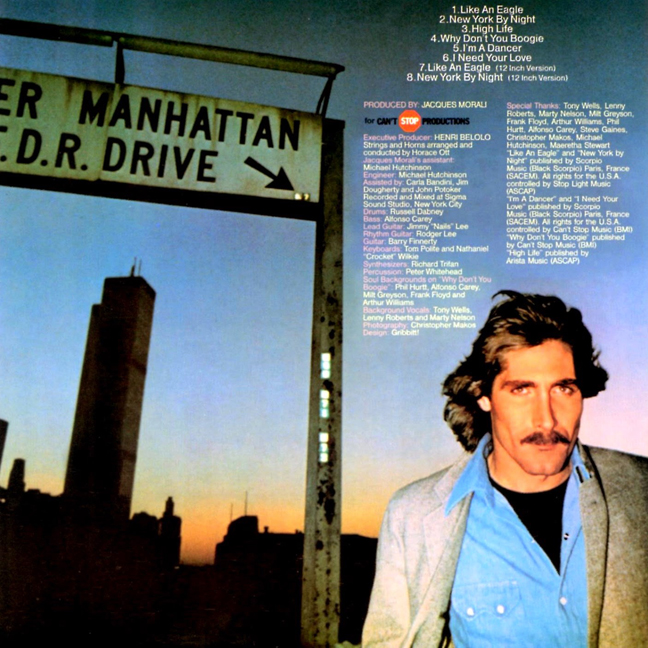
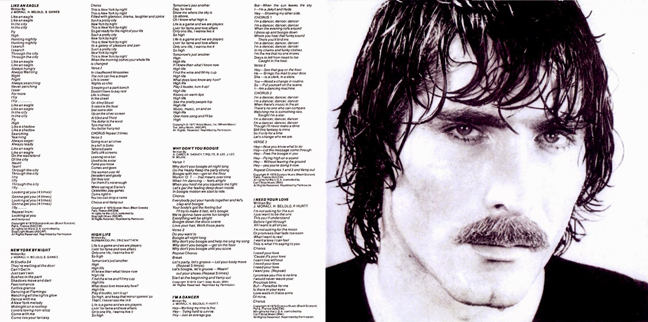
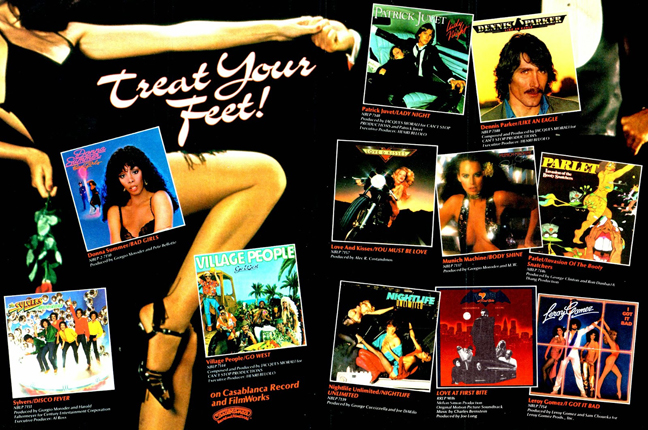
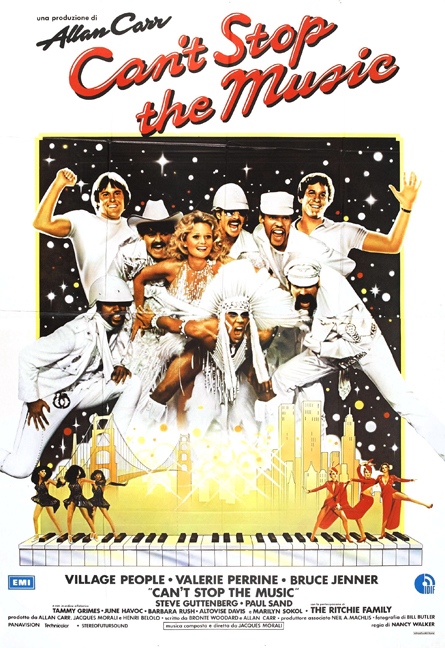
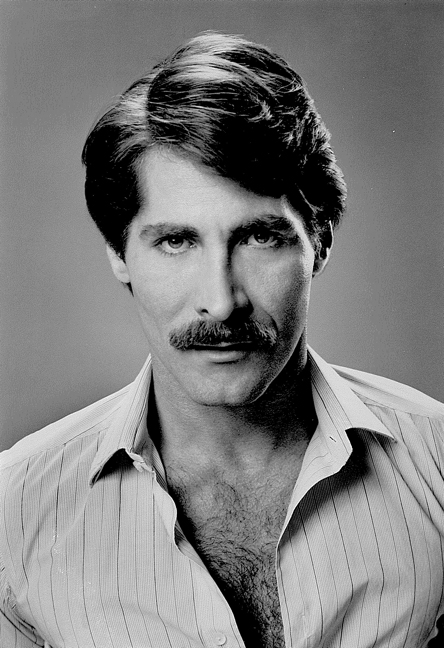
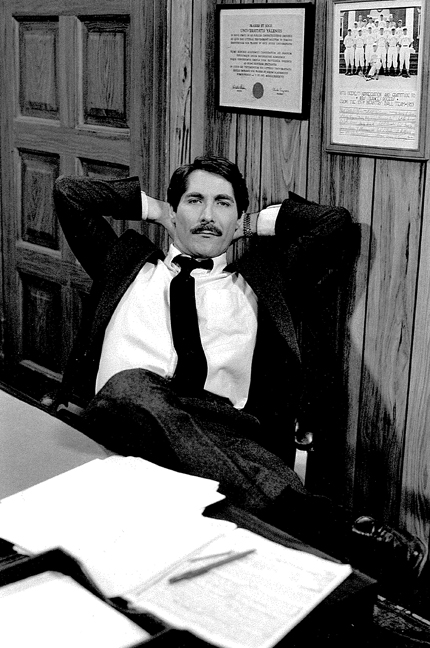
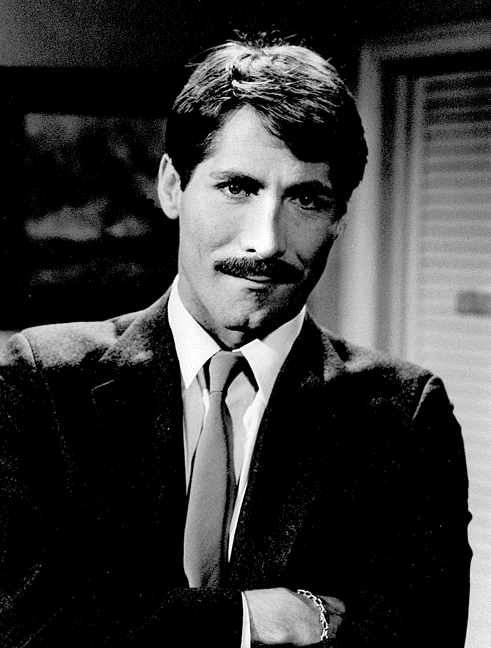
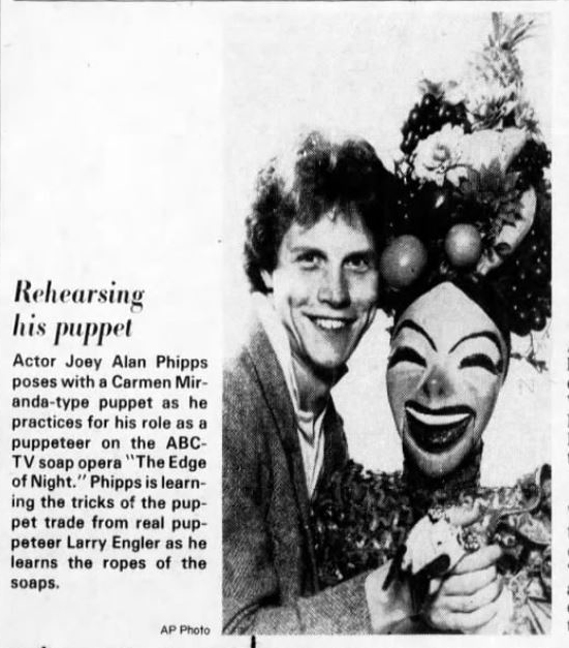
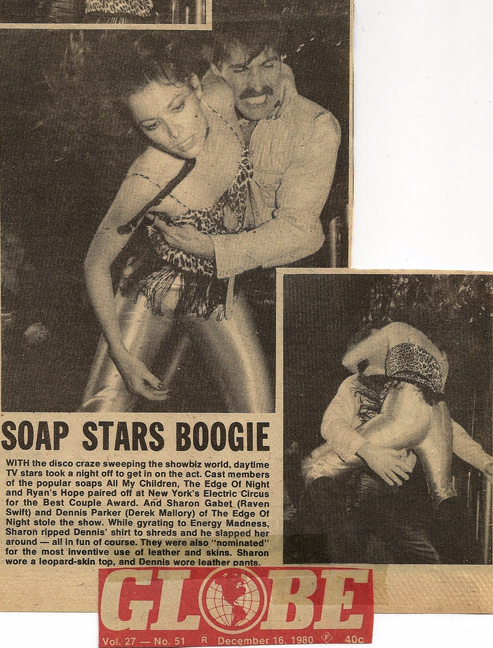
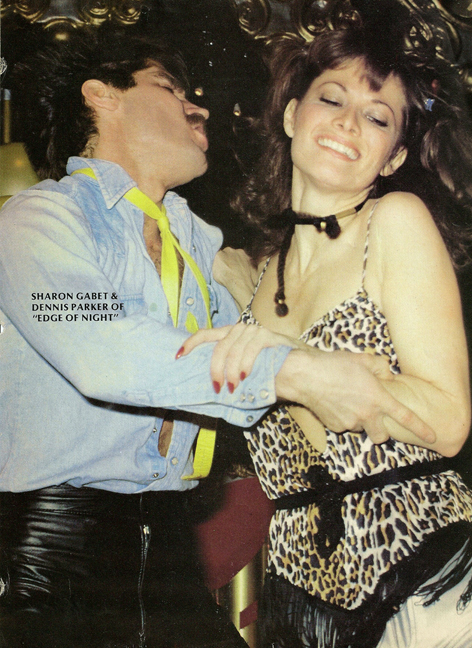
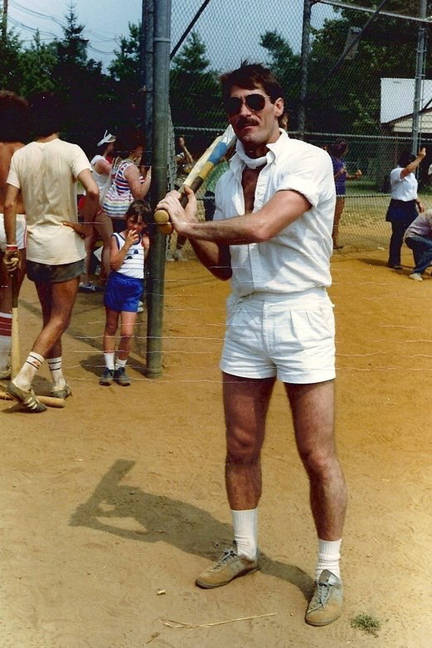
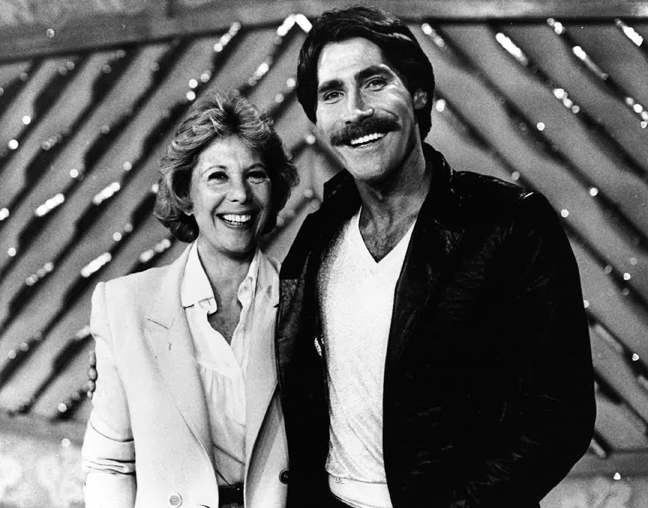
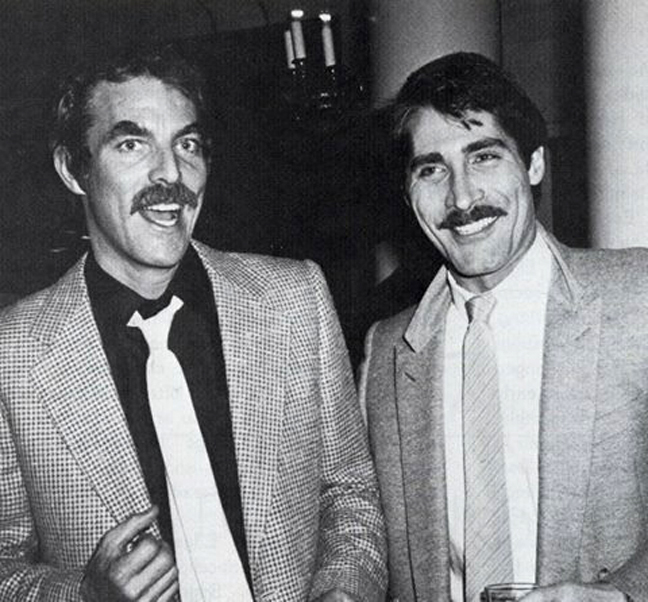
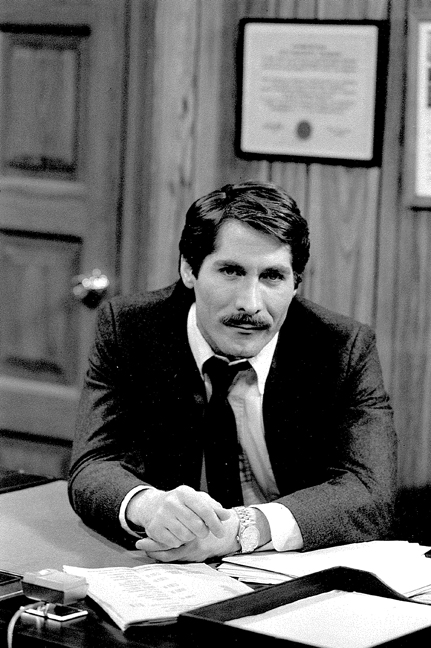
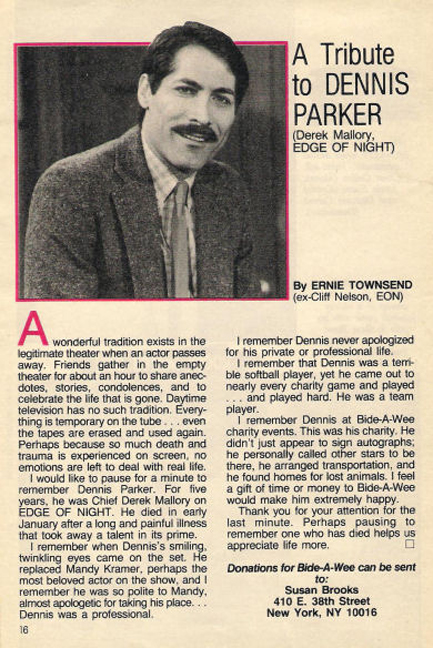
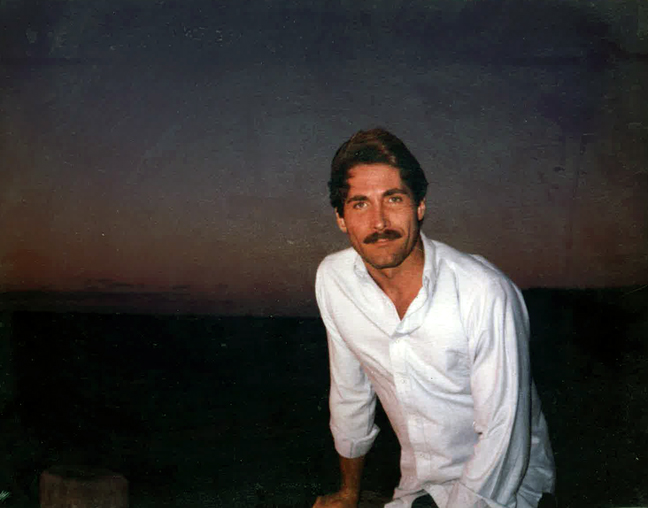
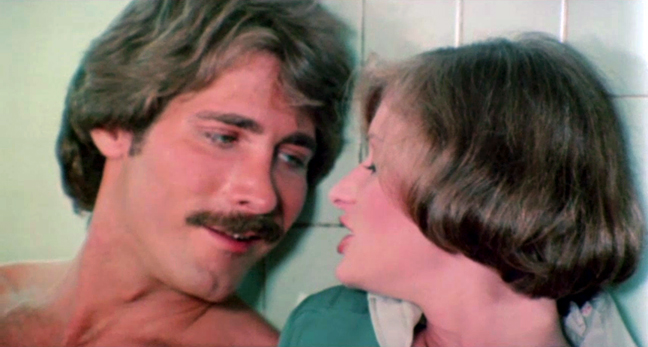
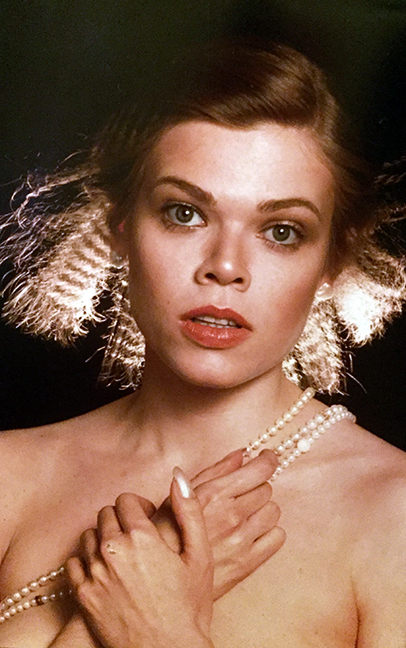
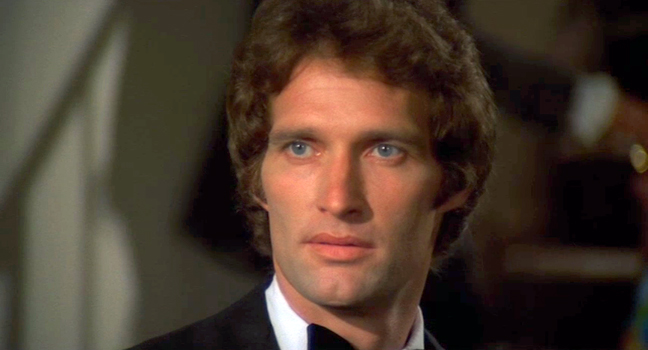

Thank you for this.
Dennis was one of the greats – in several fields and this is a beautiful tribute.
Thank you Fred!
I never thought that my questions about Dennis would be answered, but this is outstanding.
Thank you for all you do.
And is there anything about Mike Horner?
Good timing re: your question Mondo – stay tuned!
Thanks for the link to New York By Night. Not sure where I first heard it (perhaps a Merv Griffin) but had the chorus stuck in my head for years. And…now it’s stuck there again.
Any hope of a podcast soon? Love the stories, love the history but literally miss the voices.
We’re working on it Jim!
Great as ever, but unfortunately, there are only a few investigative sites such as the RReport. Thanks for the education, thanks for the assurance, America is more than the Trump Empire and all who believe in it !
Thank you Georg!
The suicide story was definitely thrown around at the time. Dennis also starred with Jamie Gillis in another gay film called “Manhole” per IMBD but advertised as “Manhold”. Directed by ‘Boy “Napped” director David Durston who is best remembered for the horror cult classic “I Drink You Blood”. “Manhole” advertised as the first full length gay film shot in 35MM and 3D and played NY’s Adonis for a few months until it disappeared. Considered a lost film, rumor was a young upcoming actor in it was cast in a network TV show and someone bought up the prints, never to seen again. Who knows.
Fascinating story. And that Like an Eagle video is amazing.
Isn’t it? It’s perfect!
You have really outdone yourselves this time: this is such an in-depth journey into the life of a man of many facets. The addition media inserts kept me riveted. Dennis’s story is so much of a specific time, it touches on every single aspect : porn, disco, Studio 54, Soap Operas and sadly AIDS.
We so appreciate the kind words Jen!
That was epic. What a fantastic read.
I never heard of Wade Nichols until Tom Byron mentioned him in RR’s recent podcast
Wade bears an uncanny resemblance in both face and body to 80’s stud Steve Drake.
I find the male talent in this business fascinating and enjoy reading about their journey.
Great insight into his life with the candid photos (family, friends, apartment) videos and newspaper articles from back in the day add a nice touch. From reading the comments from his family, friends, and co-workers , I would say Wade Nichols was one of the good guys in the biz.
I wonder when he was sitting in his NY apartment in the 70’s smoking one of those big fat joints, high as a mofo, he thought:
“Is everybody in? Is everybody in? The ceremony is about to begin. The entertainment for this evening is not new, you’ve seen this entertainment through and through you have seen your birth, your life, your death….you may recall all the rest. Did you have a good world when you died? Enough to base a movie on? (or be on the Rialto Report)
Jim Morrison
Thanks so much for the thoughtful comments GB!
Wow great story and tribute. Remembered in my teens I had the biggest crush on Dennis when I saw him when my Mother watched The Edge of Night. Not long after he died, I found out he was gay and died of AIDS. Not until I was in my twenties did I finally get to see the only gay film I could find of him Boynapped. He was an awfully talented person who’s life was cut way too soon. Thank You for the biography of this talented man.
Thank you so much for taking the time to comment James!
This article is the most gripping thing I’ve read in years. Good research and execution, you brought the subject and supporting players alive, and you should have no problem attracting producers using the story as a pitch for a film. I was an aspiring singer-songwriter new to NYC and worked as an extra one day at the Ice Palace on 57th Street when Dennis Parker was shooting his scene in the French film. I was already a fan because I liked the song and the way he was marketed. Excellent job.
Very good article. A tribute to Dennis Parker (and Henri Belolo). Thank you!
That was a nice article about Dennis Parker. I did watch The Edge of Night while still in high school. Came back during the forced locked down, and I was watching online Youtube The Edge of Night, great memories. I also had a crush on Chief Mallory. But it was sad the way he Dennis Parker died, and the connection with 5 others also dying of Aids or being HIV +
Jacques Morali, Joel Crothers, Irving Allen Lee, Dennis Parker, Joey Alan Phipps. RIP
little is known about Joey Alan Phipps his obituary and imdb of him. You have more about him then they did. I know he ended up in Palm Spring, California but nothing from the time he went there and his death. So sad with how little people put into someone who was on a show/movie/theater if they aren’t the famous A lister actors.
fantastic story, I’m a big fan of Dennis… do you know if I can see performances of him singing his songs? thanks for this article so complete… I love it!
I think I heard this song on the Showtime series ‘The Curse” episode 3. It is playing on a car stereo for just a few seconds. It caught my ear, So I looked up the lyrics ‘Like an eagle, like an eagle’ and found the song. Then looked up Dennis Parker and eventually came to this site and just read the whole thing. Totally awesome. I feel like I just sat through a movie about his life. This really could be a movie I think. What a story, Thanks.
actually ‘The Curse” episode 4, woops.
Dennis was my first love. He was however driven by the need to succeed. This I believe cost him his relationships and his life.
Thank you Rialto Report, you continue to amaze and delight and inform. The sampling of ‘Like An Eagle’ section especially!